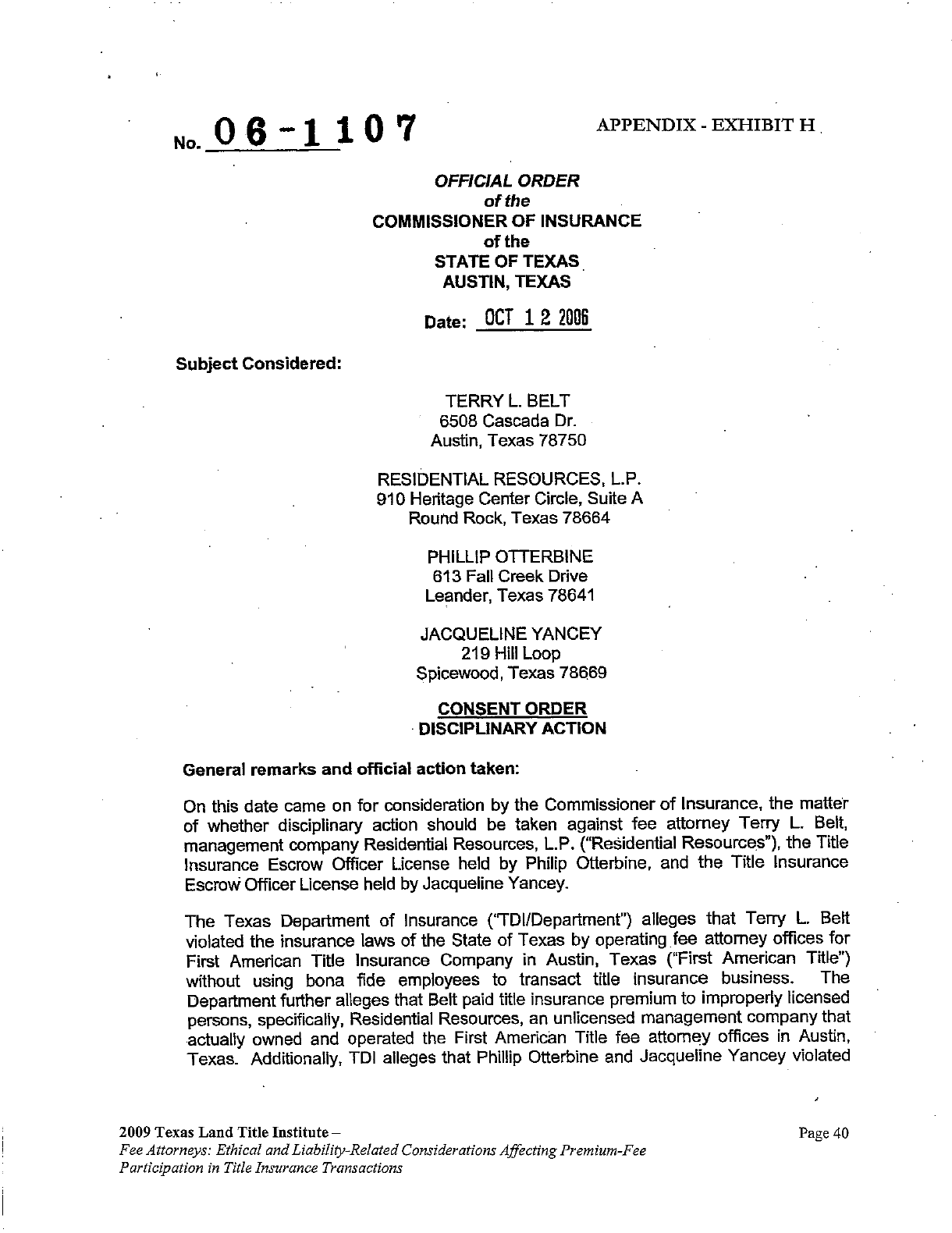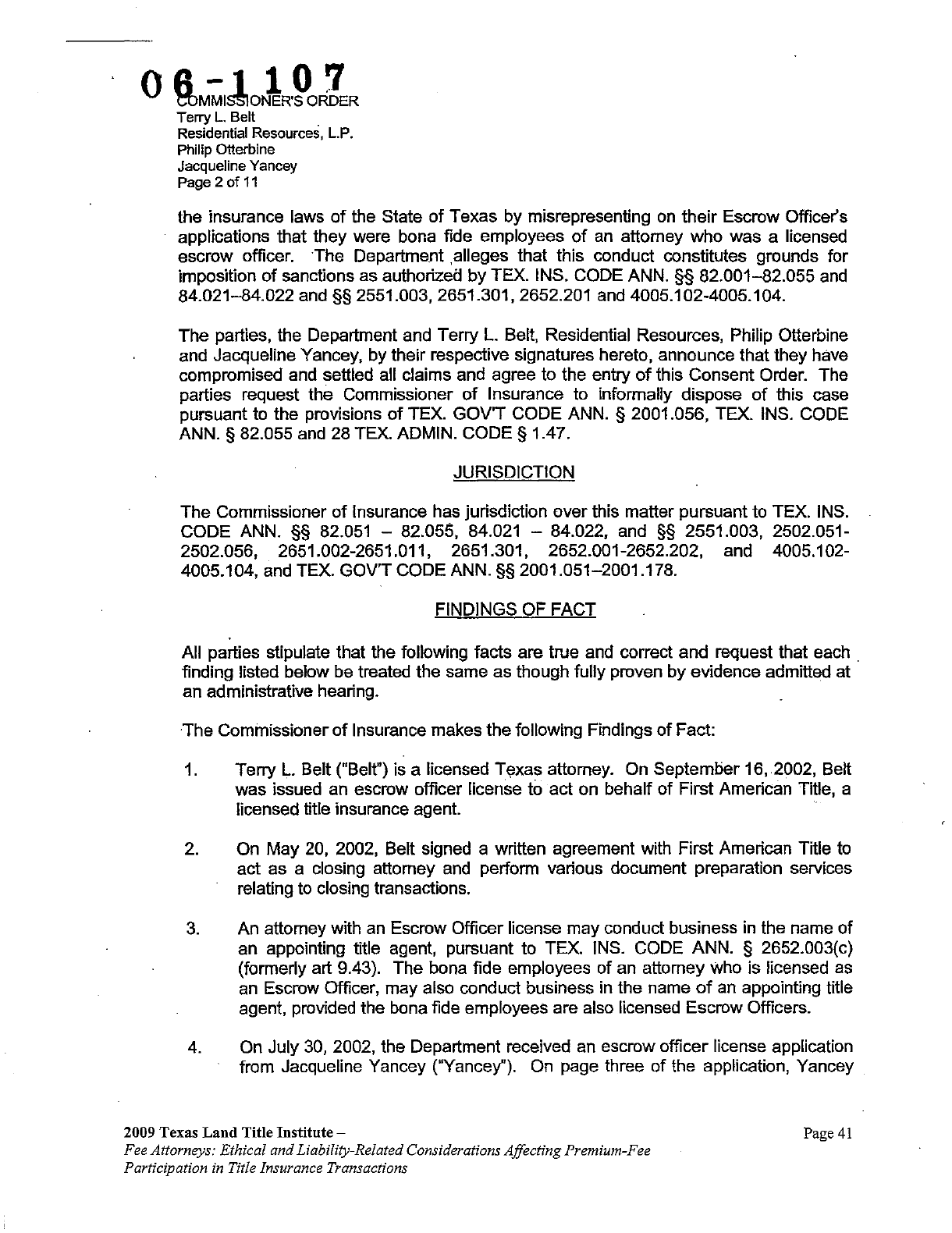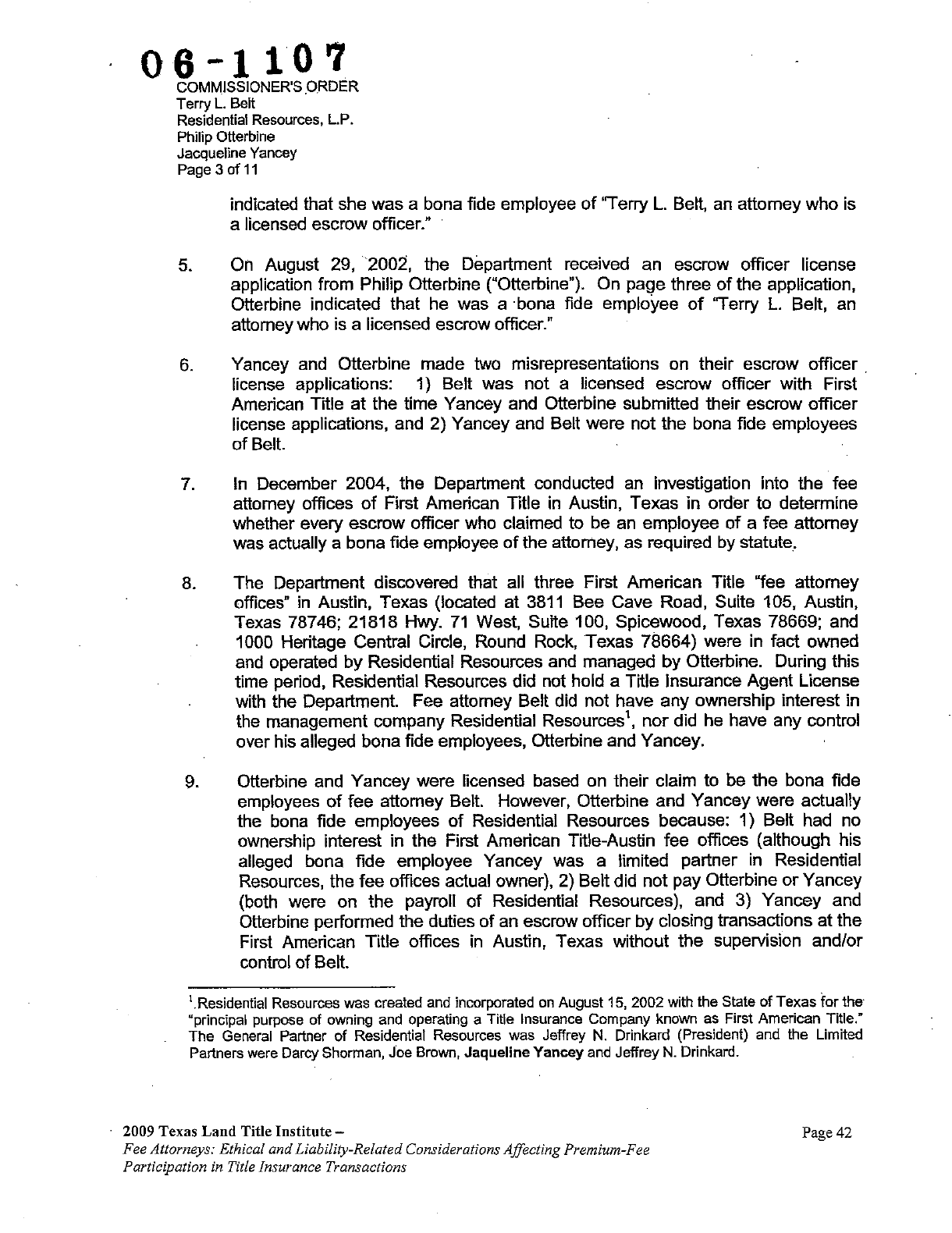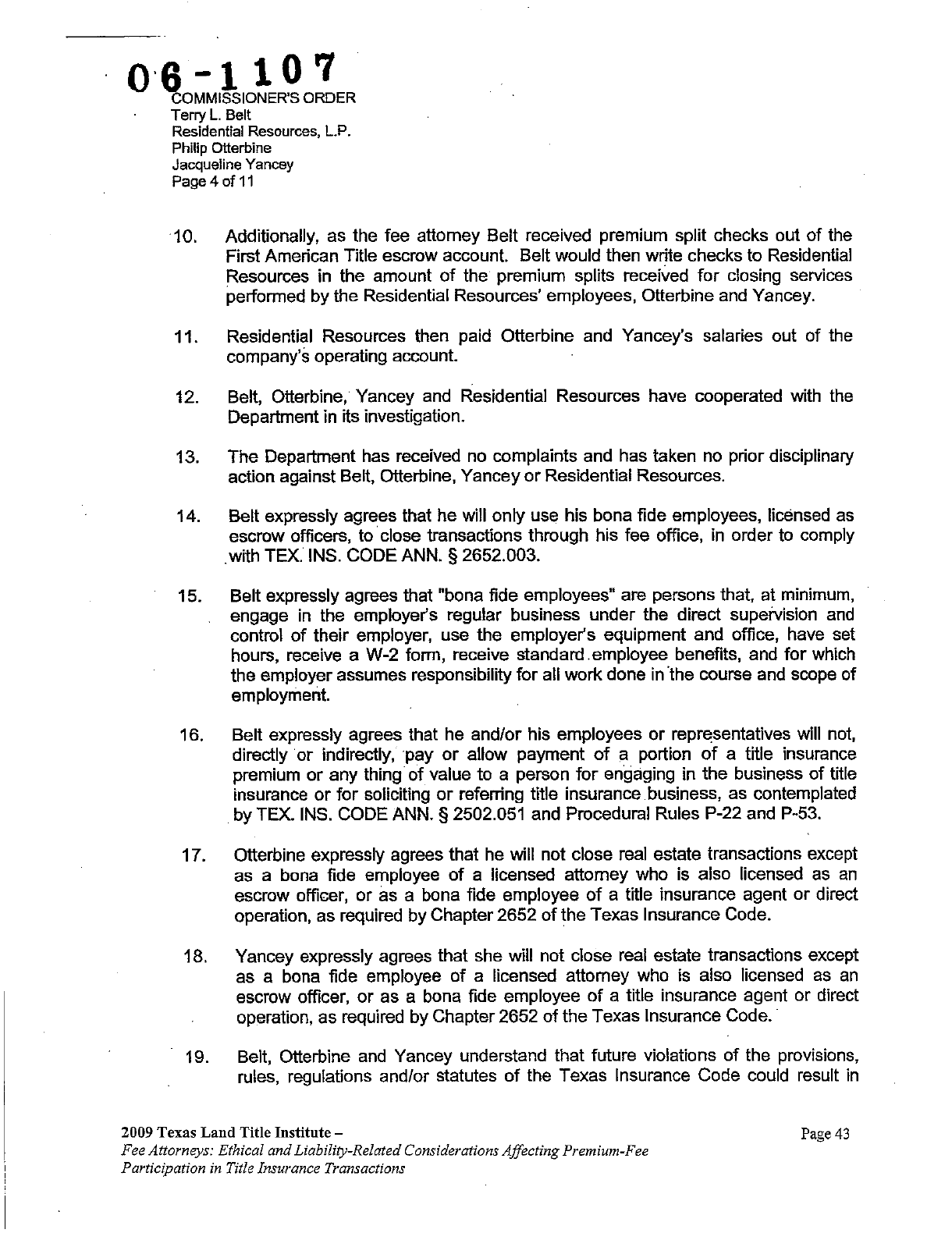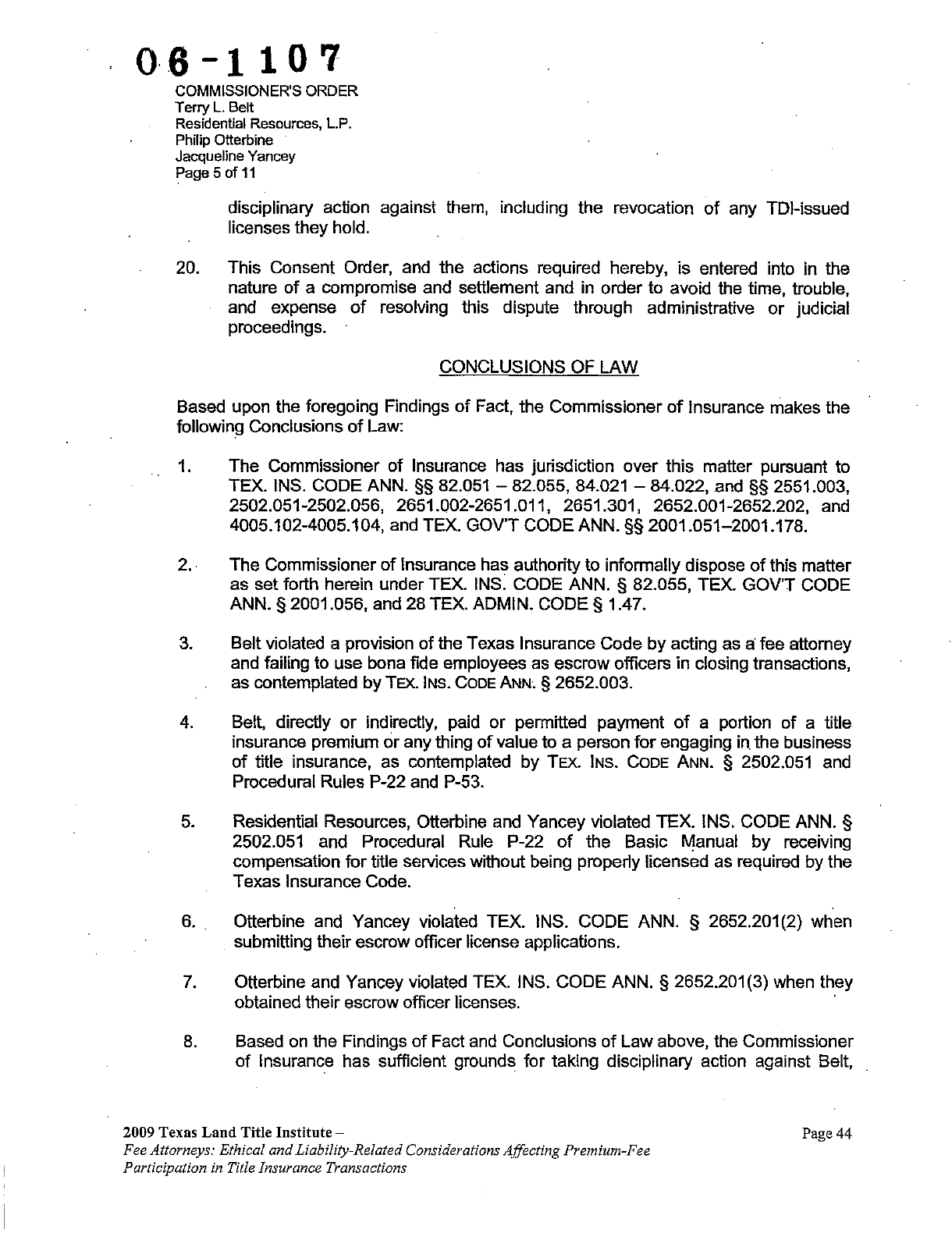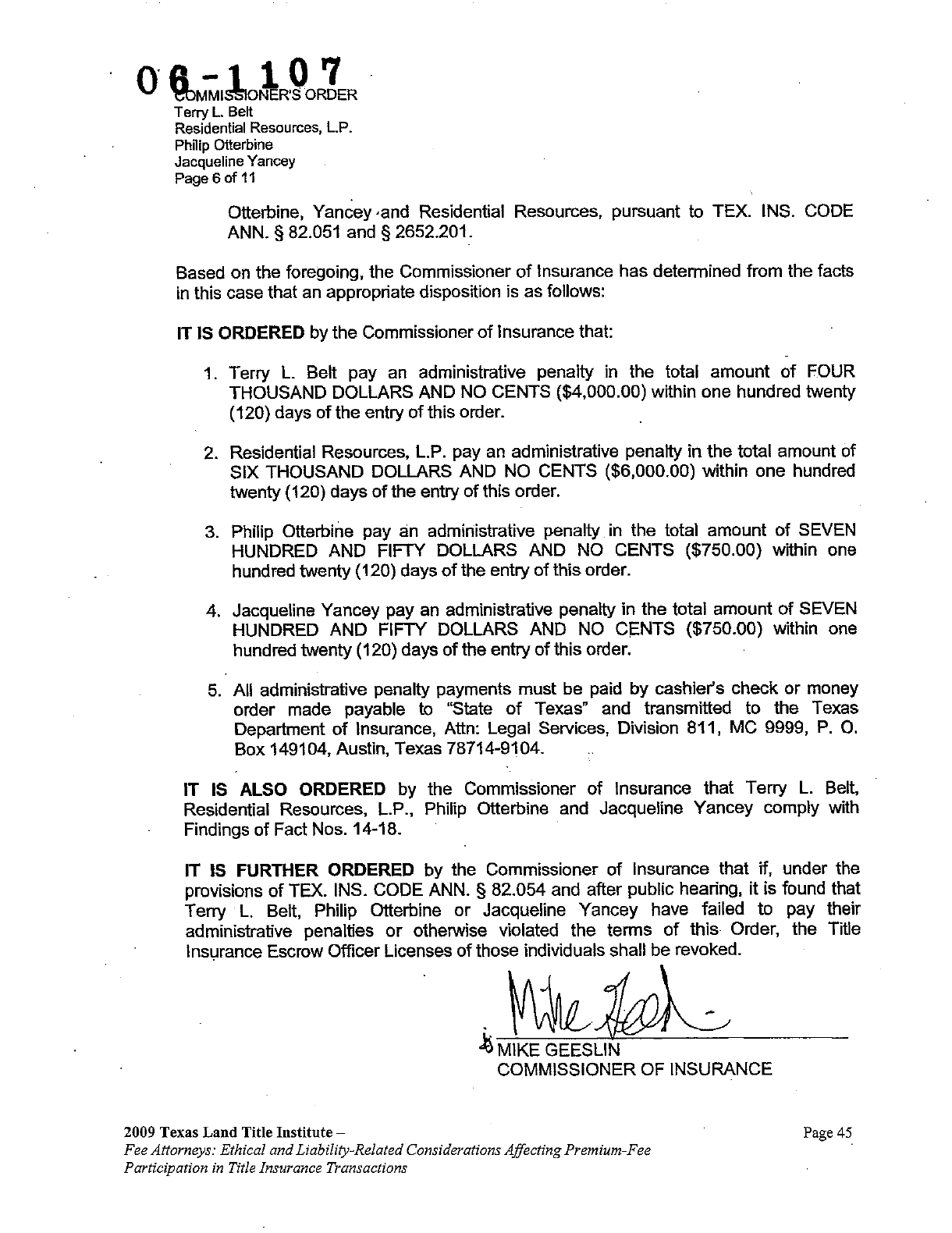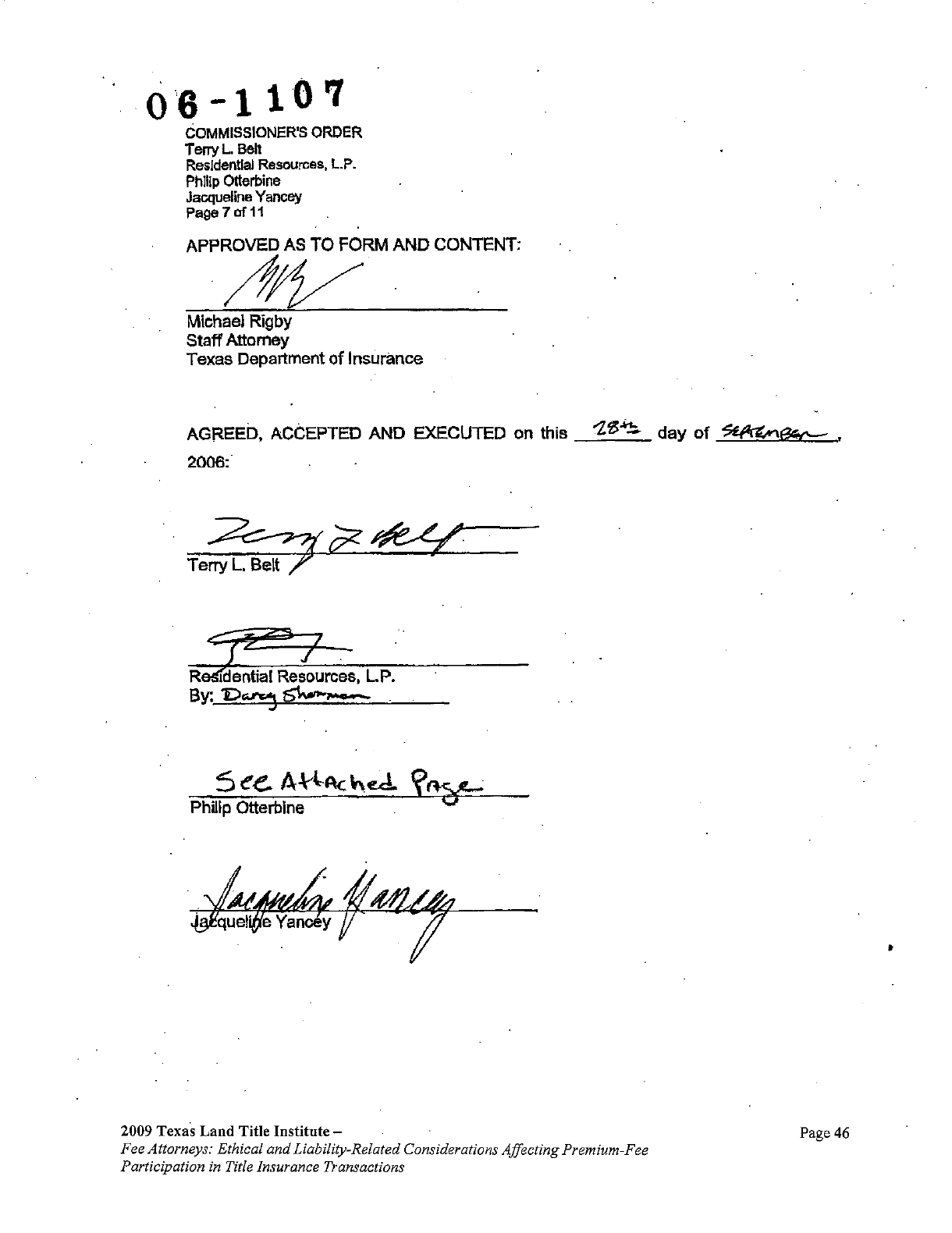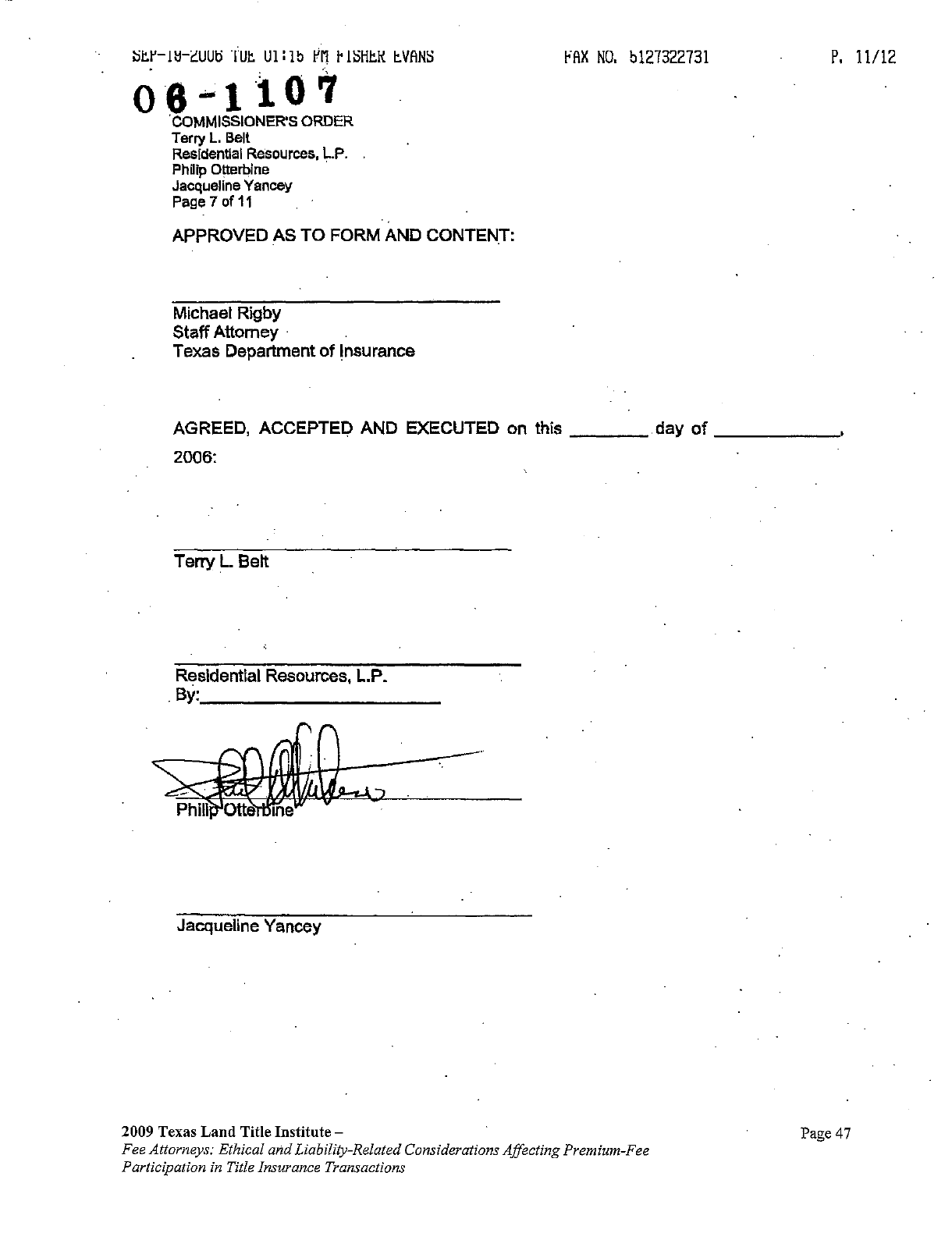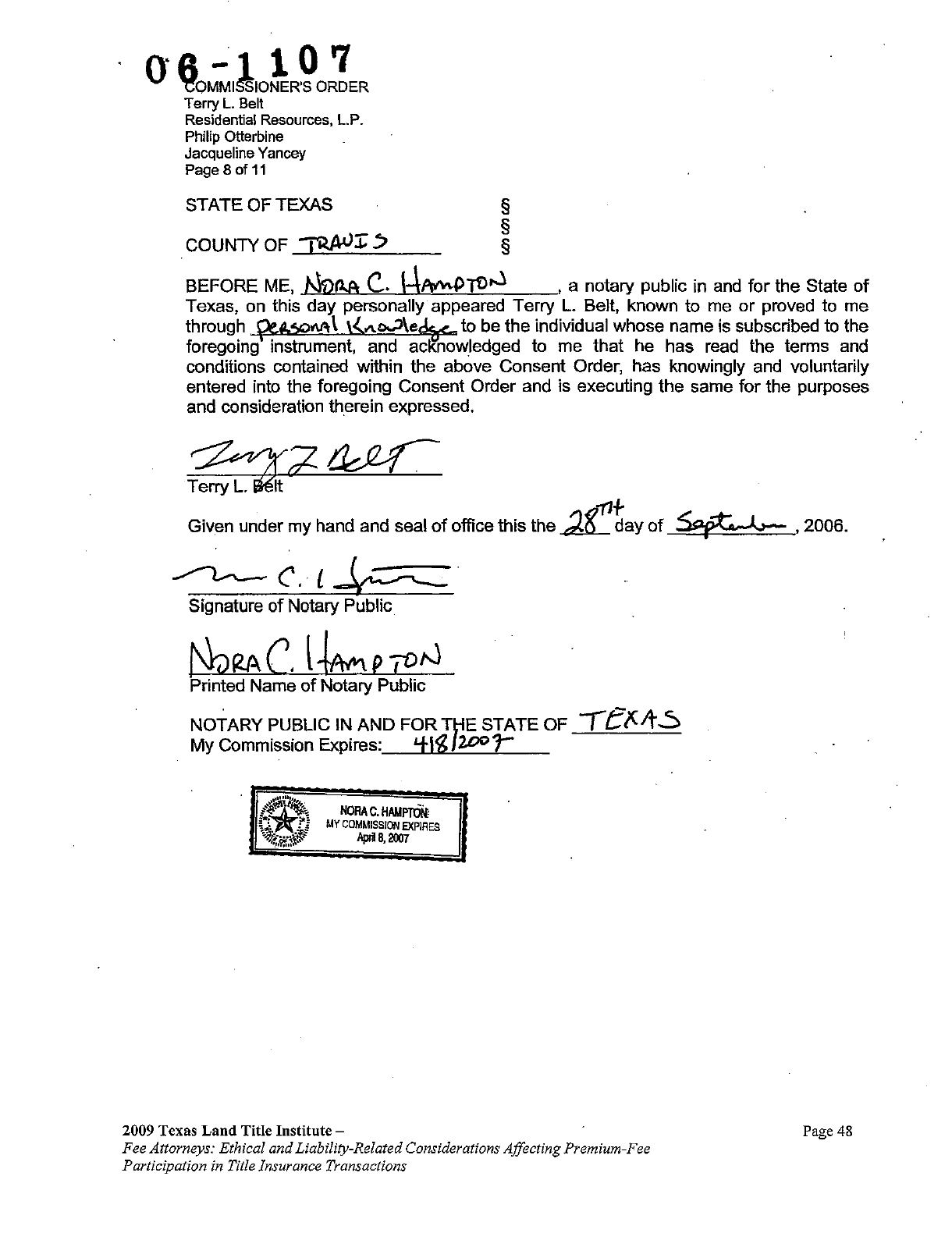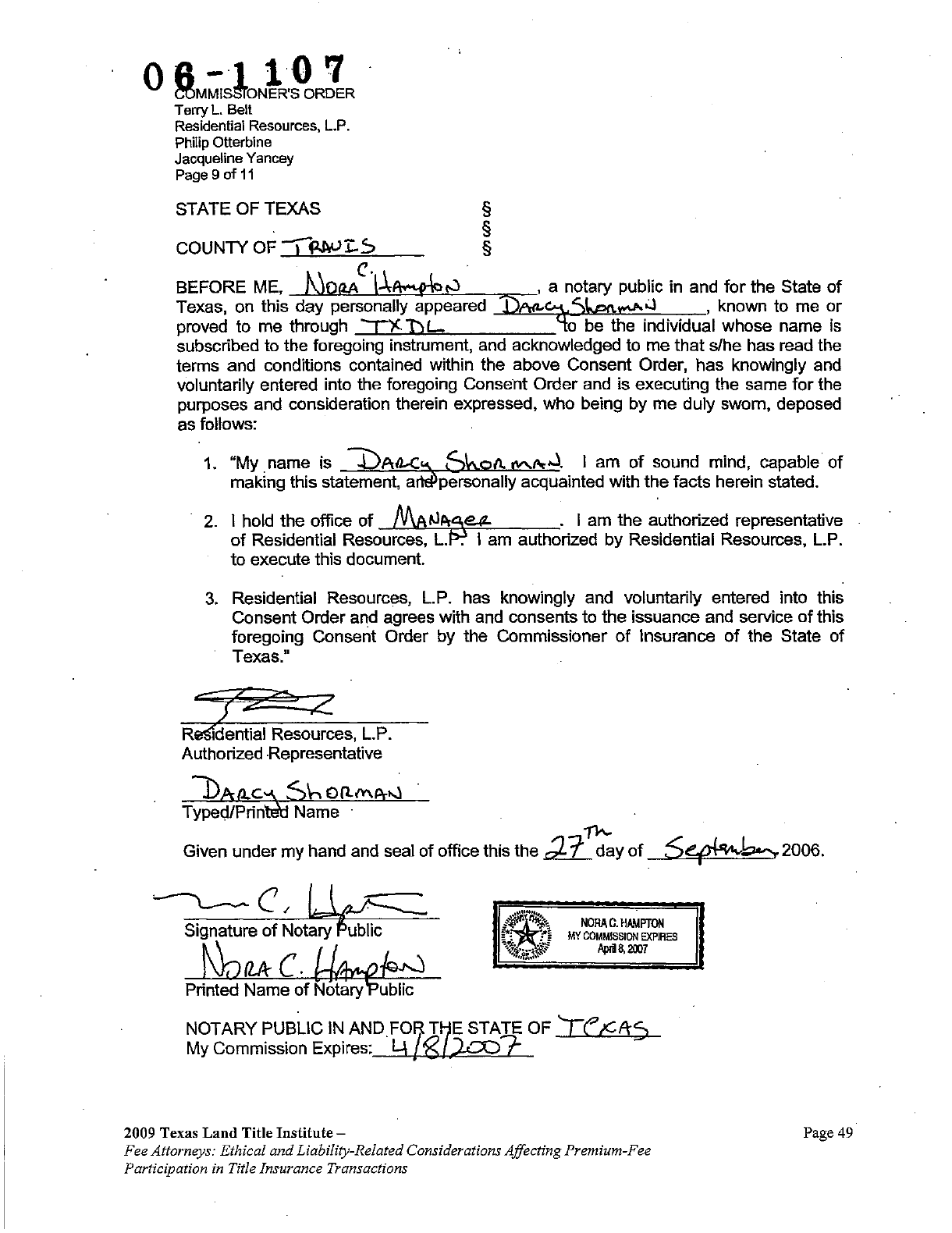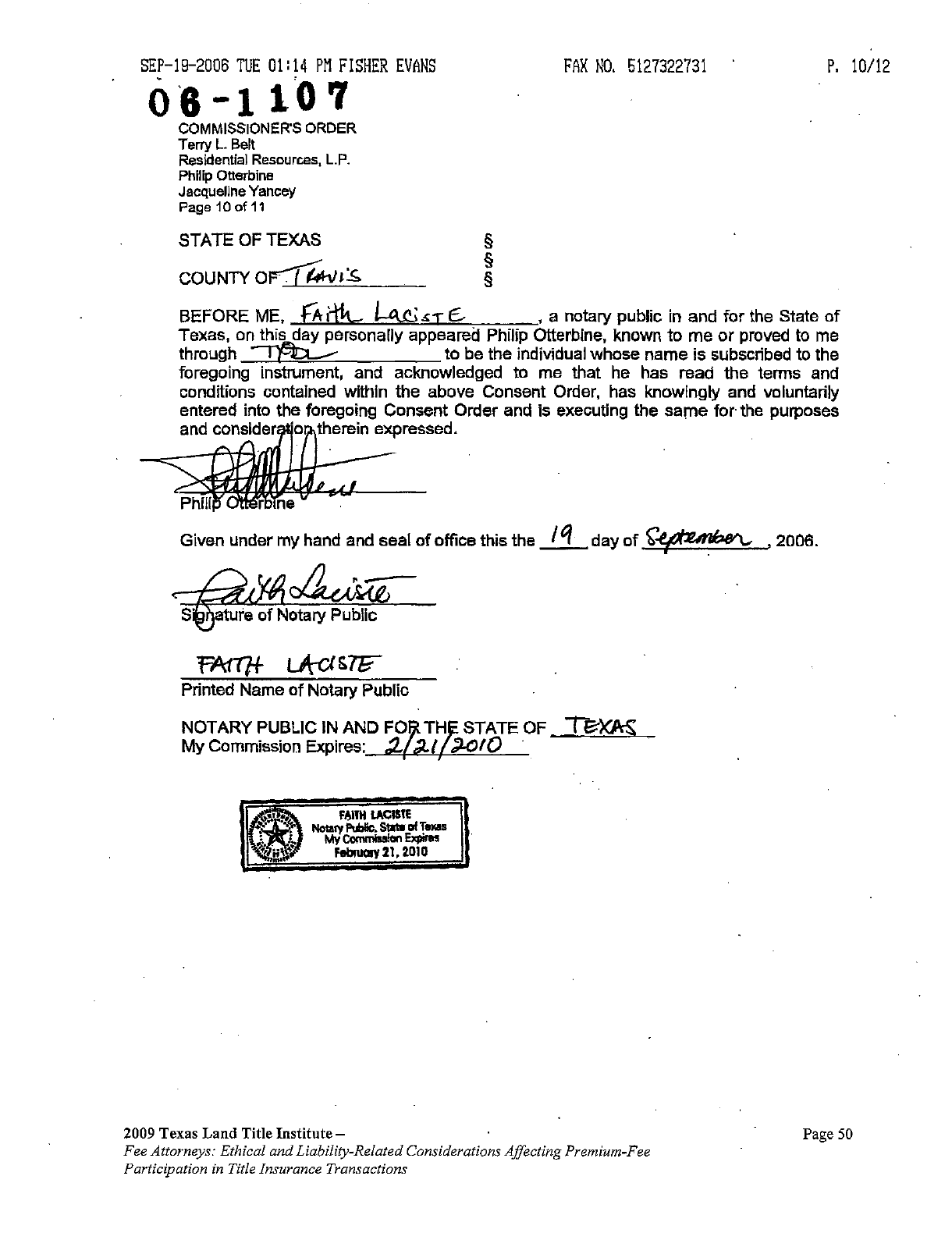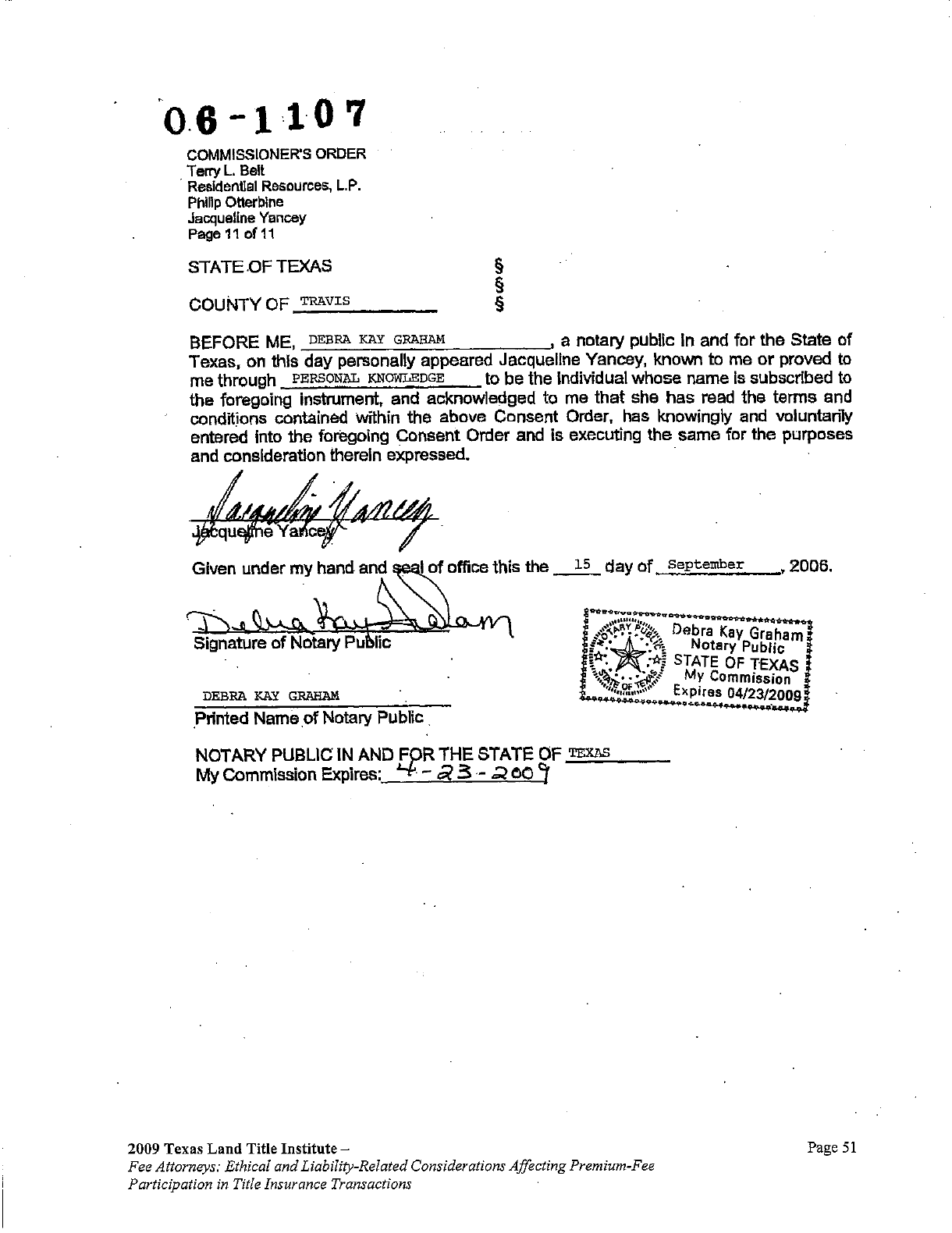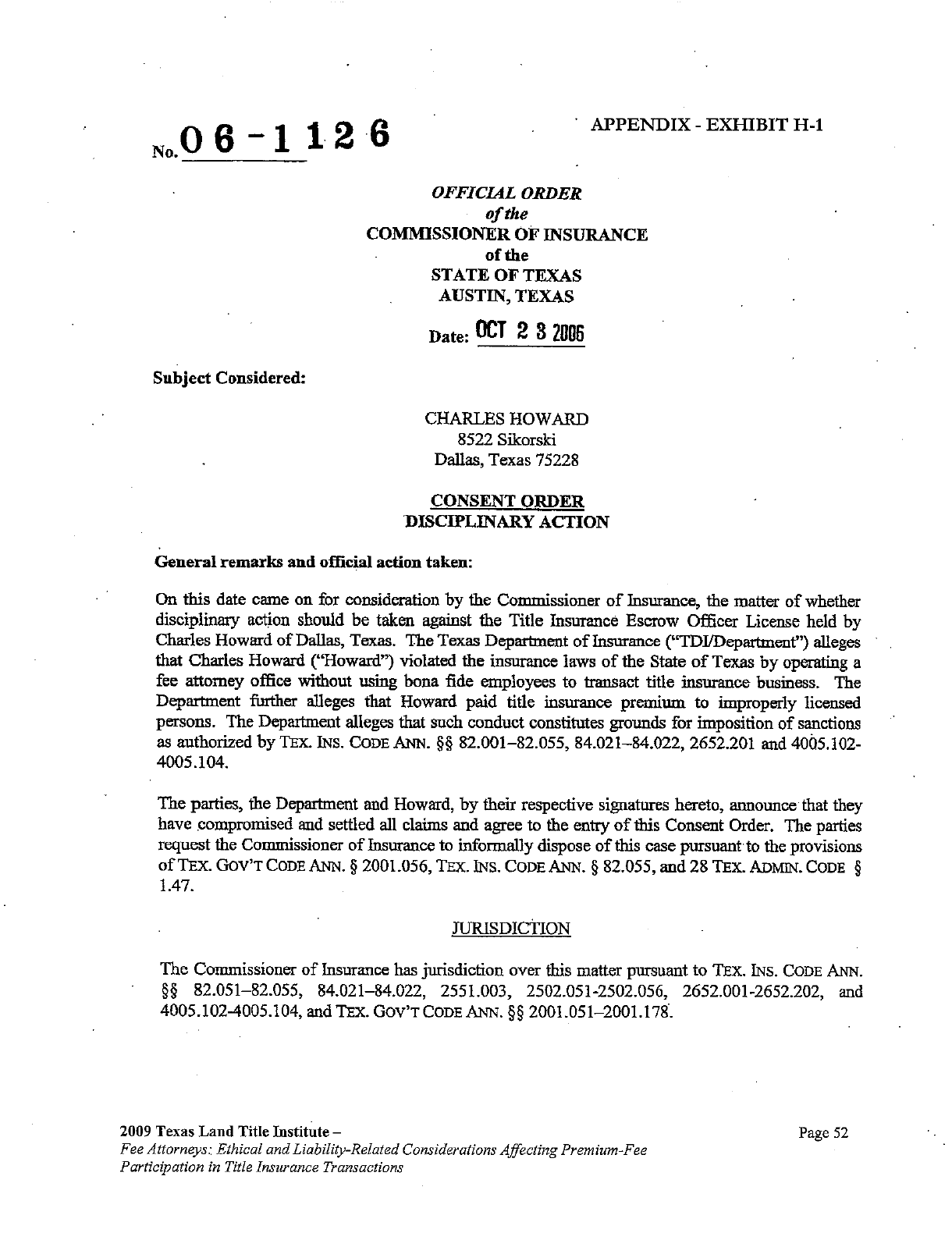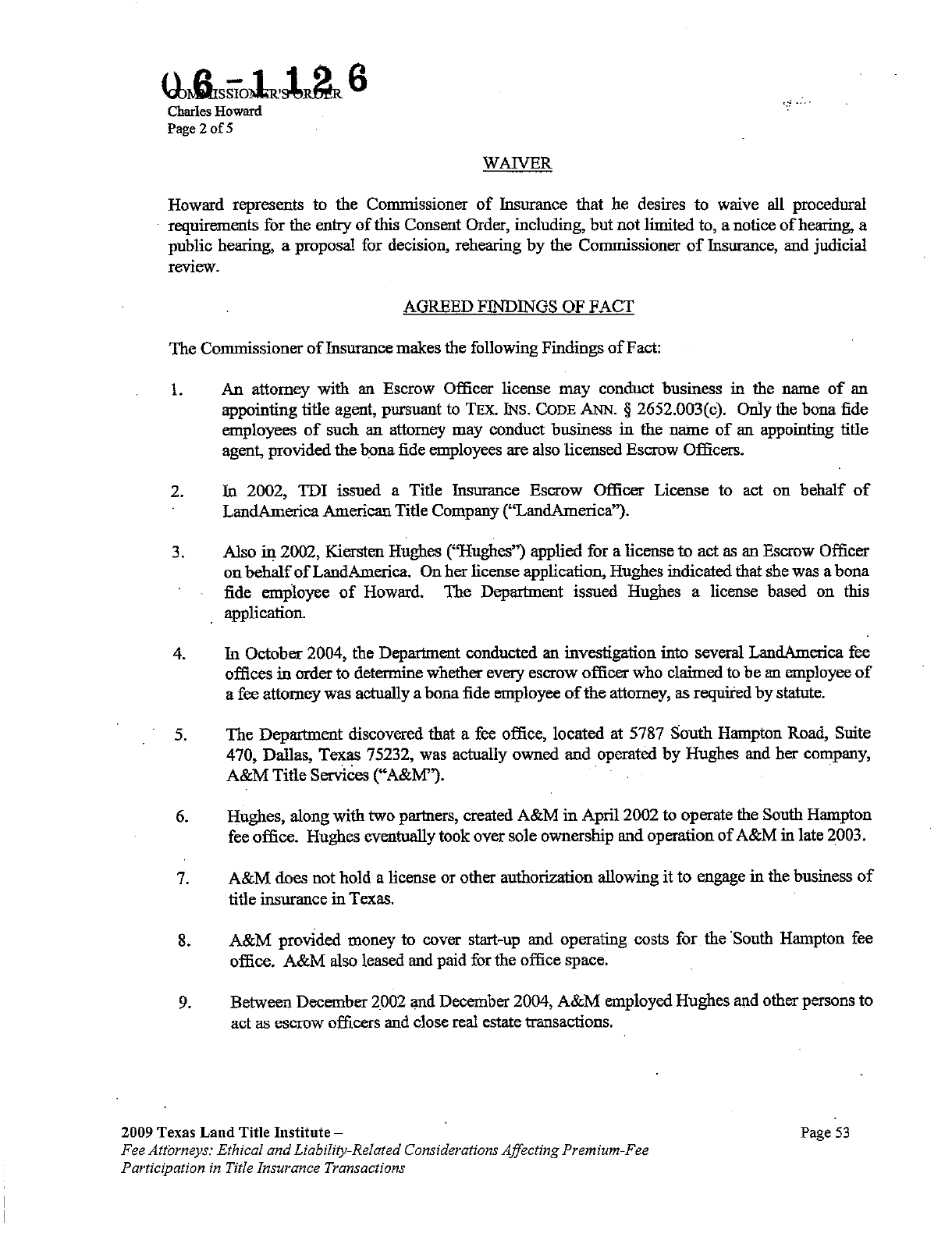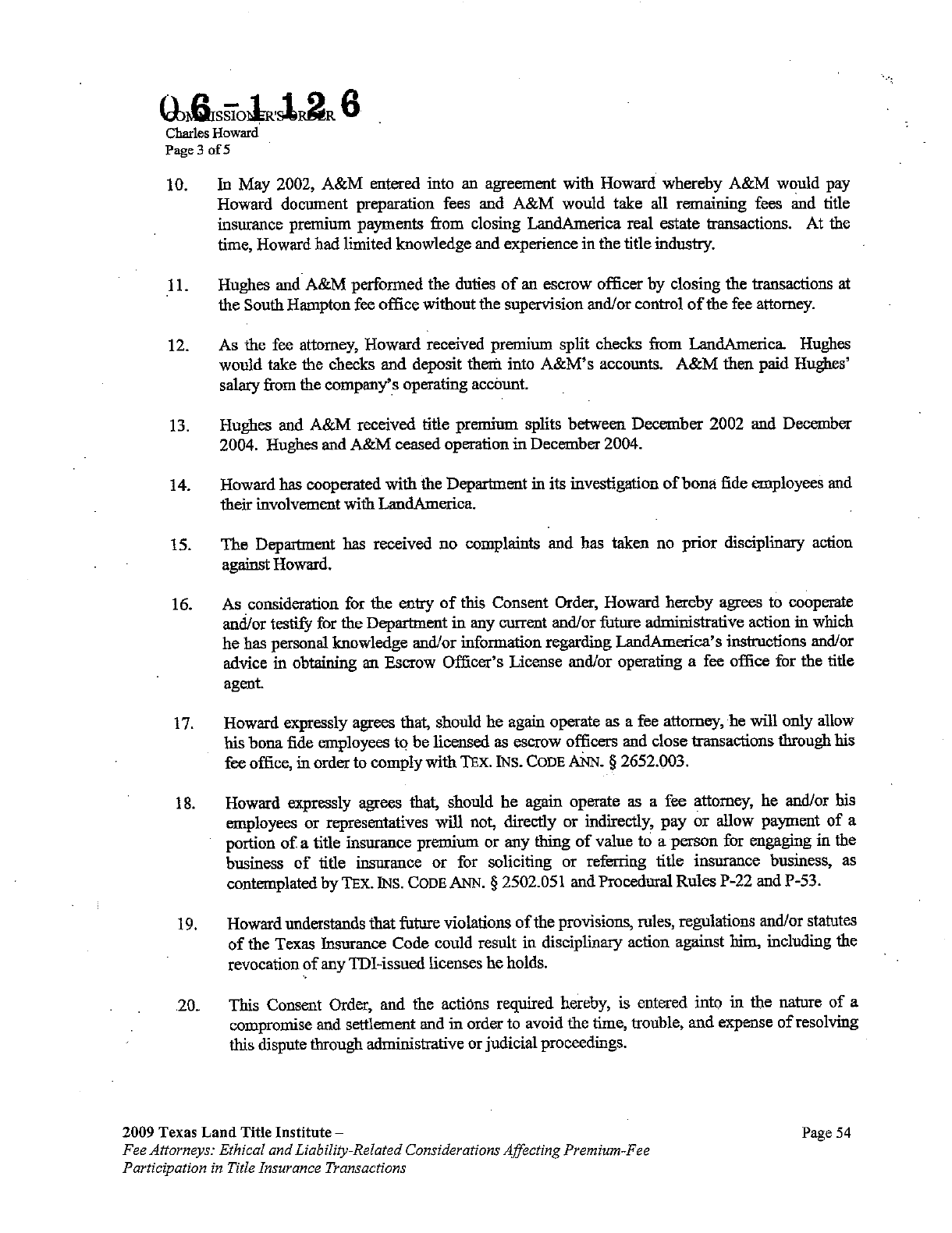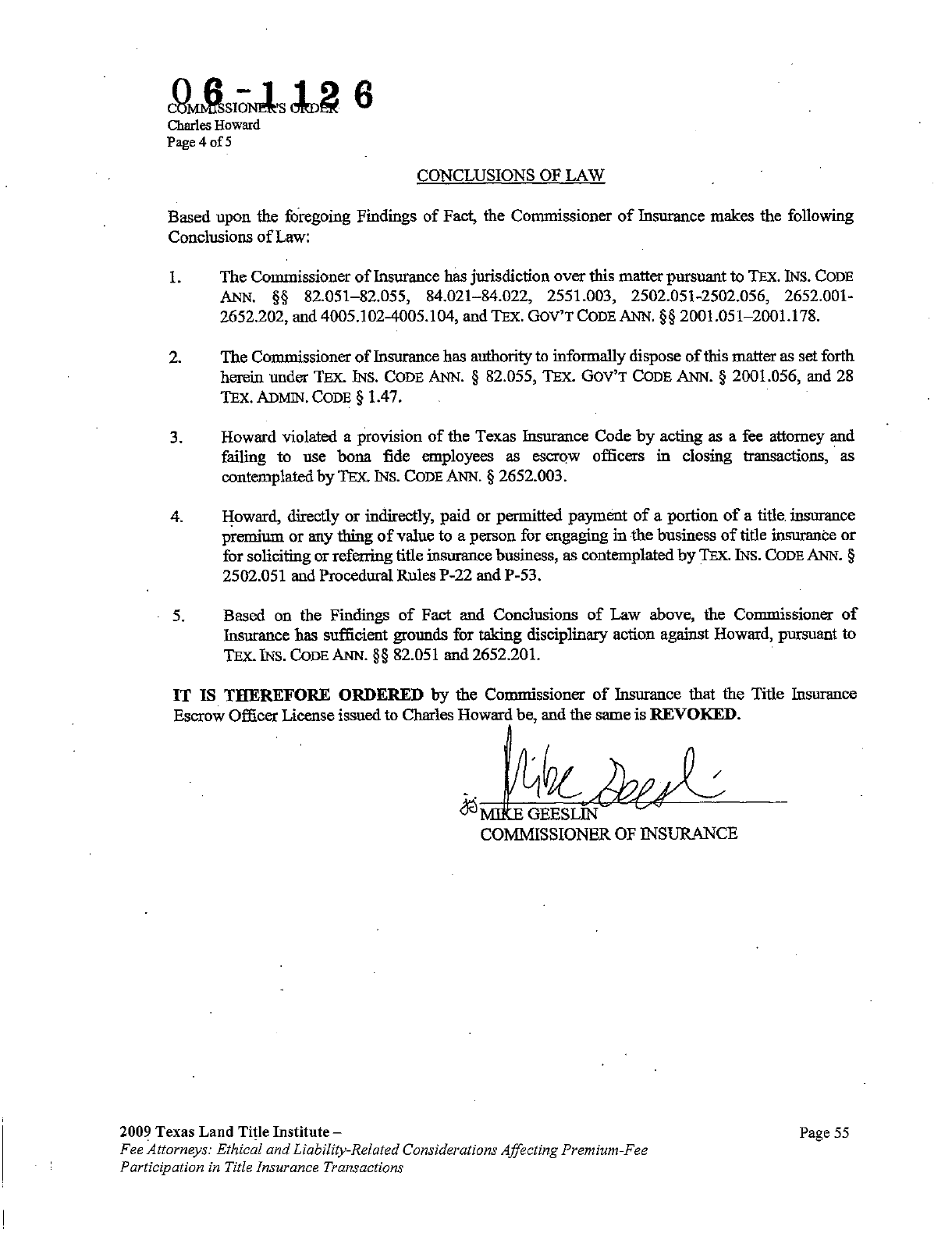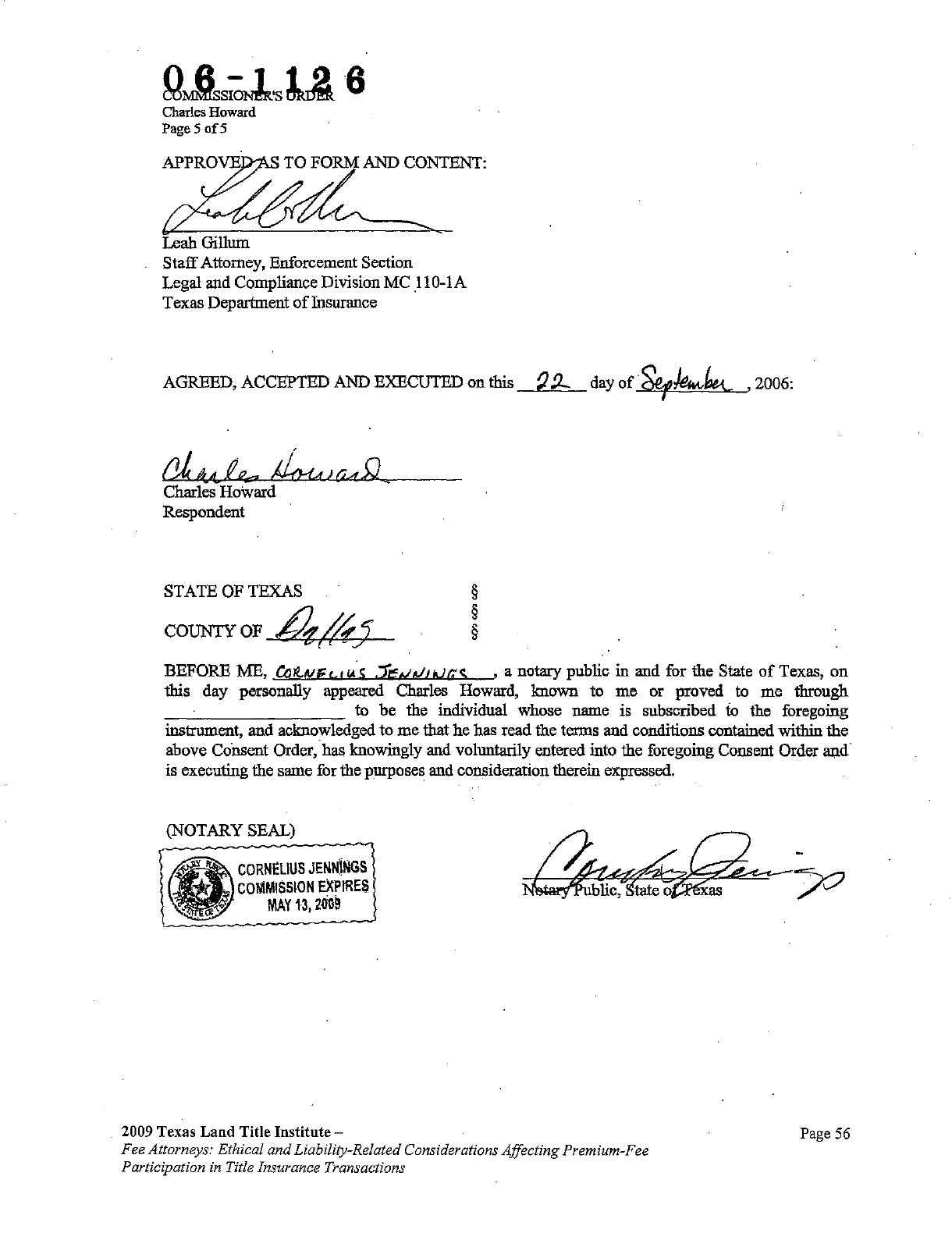FEE ATTORNEYS: ETHICAL AND LIABILITY
RELATED CONSIDERATIONS AFFECTING
PREMIUM-FEE PARTICIPATION IN TITLE
INSURANCE TRANSACTIONS
DAVID C. YOUNG
Executive Vice President and General Counsel
Stewart Title North Texas Division
Edited and presented by David C. Young,
based on materials and permission granted by:
Richard L. Black, Stewart Title Guaranty Company
and
Frank Oliver, Law Office of Frank Oliver, P.C.
2009 Texas Land Title Institute – Page 2
Fee Attorneys: Ethical and Liability-Related Considerations Affecting Premium-Fee
Participation in Title Insurance Transactions
David C. Young
Stewart Title North Texas Division
15950 Dallas Parkway, Suite 100
Dallas, Texas 75248
• Executive Vice President and General Counsel for Stewart Title North Texas Division, as
well as Vice President and Counsel for Stewart Title Guaranty Company.
• Received B.B.A. from the University of Texas, Arlington and J.D. from Southern Methodist
University School of Law, 1973.
• Have been in the Title Insurance Industry since 1973, including manager of title examination
department, manager of a branch escrow office, co-owner of an independent title agent, and
as General Counsel for an underwriter.
• Speaker at Title Association seminars, conventions, and the Land Title School.
• Provides further education to Stewart Title North Texas Escrow Officers for the purpose of
Continuing Education.
• Fellow, College of the State Bar of Texas.
• Has appeared as Expert Witness in both court suits and before the Texas Department of
Insurance.
• Served in the U.S. Army, 1968-1971, awarded Bronze Star for service in Viet Nam,
discharged as a 1
st
Lieutenant, Infantry.
• Have been chairman of many committees for the Texas Land Title Association, including:
¾ Rates, Rules and Forms
¾ Land Title School
¾ Dues and Finance
¾ By-Laws
¾ Surveyor Liaison
¾ Past Presidents Advisory Council
• Has previously held the following leadership roles:
¾ President, Fort Worth Title Association, 1982-1984
• President, Texas Land Title Association, 1988-1989
• Recognized as ‘Titleman of the Year’ by Texas Land Title Association in 1986.
2009 Texas Land Title Institute – Page 3
Fee Attorneys: Ethical and Liability-Related Considerations Affecting Premium-Fee
Participation in Title Insurance Transactions
FEE ATTORNEYS: ETHICAL AND LIABILITY-RELATED
CONSIDERATIONS AFFECTING PREMIUM-FEE
PARTICIPATION IN TITLE INSURANCE TRANSACTIONS
OUTLINE
I. TERMINOLOGY
A. Fee Attorney
B. Approved Attorney
C. Examining Attorney
D. Doc Prep Attorney
II. APPLICABLE REQUIREMENTS FOR RECEIVING A PORTION OF THE
TITLE INSURANCE PREMIUM
A. General Rules Concerning the Amount of the Premium Split
B. Tex. Title Insurance Act Sect. 2502.051 et seq.
C. Texas Title Insurance Basic Manual Procedural Rule P-22
D. Tex. Disciplinary Rules of Professional Conduct, Rule 1.04(a)
E. Tex. Comm. On Professional Ethics. Op. 408, V.47 Tex. B.J. 44 (1984)
F. Texas Department of Insurance Bulletin No. 167
III. THE TITLE INSURANCE COMPANY BECOMES A CLIENT
A. Tex. Comm. On Professional Ethics, Op. 408, V.47, Tex. B.J. 44 (1984)
B. Closing the Transaction is a Key Statutory Term of Art
C. Use of the P-22 Letter to Define the Scope of the Engagement with Title
Company
D. The Importance of Proper Completion of the Form T-00 Verification of
Services Rendered and the Itemized Statement of Services
E. Suggested Descriptive Model of the Fee Attorney or Approved Attorney
Relationship
IV. REPRESENTATION BY THE FEE ATTORNEY OR APPROVED ATTORNEY
OF MULTIPLE PARTICIPANTS IN THE REAL ESTATE TRANSACTION
A. Rule 1.06 Conflict of Interest: General Rule
B. Disclosure and Consent to Multiple Client Representation
C. Disclosure of Non-Representation to Non-Client Transaction Participants
D. Summary of Requirements
V. CONCLUSION

2009 Texas Land Title Institute – Page 4
Fee Attorneys: Ethical and Liability-Related Considerations Affecting Premium-Fee
Participation in Title Insurance Transactions
ETHICS AND LIABILITY
CONSIDERATIONS FOR FEE ATTORNEYS
AND APPROVED ATTORNEYS
The participation of an attorney in one or more aspects of the real estate closing process presents
a number of ethics and liability considerations and challenges. The participants in the typical real
estate transaction seller, buyer, borrower, lender, mortgage broker, title underwriter, title agent,
and real estate broker may have expectations or beliefs concerning the existence and scope of
legal representation by an attorney participating in the process that are completely at odds with
the limited role the attorney believes that he or she is actually performing or intending to
perform. A lack of clarity in defining and communicating regarding the existence and scope of
legal representation can give rise to serious ethics risks and the potential of malpractice and other
liability risks for the attorney.
The risk of confusion by a transaction participant concerning the existence and scope of an
attorney-client relationship is particularly acute for the attorney who closes the real estate
transaction as a fee attorney or approved attorney and receives a portion of the title insurance
premium from the title insurance company and an additional escrow closing fee or settlement fee
from the buyer and seller. If the attorney also prepares transaction documents, the risk of
confusion is only heightened.
This presentation is intended to discuss some of the principal ethics rules and liability
considerations that come into play when an attorney is functioning as, a fee attorney or approved
attorney, including consideration of those transactions in which the fee attorney or approved
attorney may also be representing one or more of the transaction participants.
I. Terminology
While there is geographic and title company variation in terminology, usage and practice,
for the purpose of convenience, the following terminology is used in this presentation:
A. Fee Attorney
:
• Business conducted under the name of the title company
• Uses title company signage, stationary, business cards, etc.
• Attorney and staff are licensed escrow officers of the title company
• Receives a percentage of the title insurance premium
• Charges an additional escrow fee for settlement services
• Operates under a detailed contract with the title company
• Escrow accounts subject to TDI auditing requirements
Insured closing service letter [Form T-50 or T-51] usually made available by the
title insurance company to cover escrow defalcations and failure to follow closing
instructions.

2009 Texas Land Title Institute – Page 5
Fee Attorneys: Ethical and Liability-Related Considerations Affecting Premium-Fee
Participation in Title Insurance Transactions
B. Approved Attorney:
• Does not operate under the title company's name
• Conducts business as an independent law firm
• Attorney and his staff are not licensed escrow officers of the title
company
• Receives a percentage of the title insurance premium
• Charges an additional escrow fee for settlement services
• Operates under a simple P-22 letter setting forth the attorney's schedule
of charges
• Escrow accounts not subject to TDI auditing requirements
• Insured closing service letter is not made available by the title
insurance company
C. Examining Attorney:
• Examines title for the title insurance company
• Some continued use in rural areas
D. “Doc Prep” Attorney:
• May be independent attorney representing only the lender for a fee paid
at closing by the borrower
• Maybe affiliated in some manner with a title company or title agent,
such as an owner of the title agent or an attorney-employee of the title
agent
II. Applicable Requirements for Receiving a Portion of the Title Insurance
Premium
When a portion of the title insurance premium is paid by the title insurance company
to the fee attorney or approved attorney, there are statutory, regulatory, and ethics
requirements that apply and must be followed by the fee attorney or approved attorney.
A. General Rules Concerning the Amount of the Premium Split:
i. The portion of the title insurance premium received by the fee attorney or
the approved attorney must be reasonable in amount and commensurate
with the services actually performed by the fee attorney or approved
attorney.
ii. A written schedule of the charges normally made by the attorney for such
services must be filed with the title insurance company at least thirty (30)
days before the services are rendered, and the schedule must have been
agreed to and approved by the title insurance company.

2009 Texas Land Title Institute – Page 6
Fee Attorneys: Ethical and Liability-Related Considerations Affecting Premium-Fee
Participation in Title Insurance Transactions
iii. At or prior to the time of receiving, payment of a portion of the premium,
the attorney must submit to the title insurance company a written itemized
statement or invoice, that details the services actually rendered.
B. Tex. Title Insurance Act Section 2502.051 et seq.
i. No commission, rebate, discount, portion of any title insurance premium,
or other thing of value shall be directly or indirectly paid, allowed or
permitted by any person doing, the business of title insurance or received
or accepted by any person for doing the business of title insurance or for
soliciting or referring title insurance business.
ii. This Article may not be construed as prohibiting: ... (4) payments for
services actually performed by an attorney in connection with title
examination or, closing a transaction, which, payment may not exceed a
reasonable charge for such services.
iii. The payment or receipt of a commission, rebate, discount, or other thing
of value to or by, any person for soliciting or referring title insurance
business in violation of this Article is engaging in the unauthorized
business of insurance, and in addition, to any other penalty, after
notice and opportunity for hearing, is subject to a monetary forfeiture
not less than the value nor more than three times the value of the
commission, rebate, discount, or other thing of value.
iv. No person shall give and no person shall accept any portion, split, or
percentage of any charge made or received for the rendering of a real
estate settlement or closing in connection with a transaction involving the
conveyance or mortgaging of real estate located in the State of Texas other
than for services actually performed.
C. Texas Title Insurance Basic Manual Procedural Rule P-22
:
NOTE
: THE FULL TEXT OF PROCEDURAL RULE P-22 IS ATTACHED AS
EXHIBIT A
TO THE APPENDIX FOR REFERENCE.
" No payment shall be made by a Title Insurance Company, Title Insurance Agent,
Escrow Officer or any employee or agent of any of them, to any Person who is not its
bona-fide employee, for examination of a title and/or closing a transaction unless:
(A) Such Person is (i) a Title Insurance Company as defined in Sect. 2501.003, Texas
Insurance Code, and qualified to do business in the State of Texas, (ii) a Title
Insurance Agent as defined in Section 2501.003, in Texas Insurance Code, and
licensed to do business in the State of Texas by the Texas Department of Insurance,

2009 Texas Land Title Institute – Page 7
Fee Attorneys: Ethical and Liability-Related Considerations Affecting Premium-Fee
Participation in Title Insurance Transactions
or (iii) an attorney at law duly licensed by the Supreme Court of Texas to practice
law in the State of Texas, to the extent not inconsistent with the Texas Insurance
Code, or (iv) any Person legally authorized to perform such services; and
(D) Any payment made must be commensurate with the services actually performed;
and
(E) The Person rendering the service shall have filed with the Company at least thirty
(30) days prior to the rendering of such service a written schedule of charges
normally' imposed by such Person for such services (Schedule) and such Schedule
shall have been agreed to and approved by the Company as being reasonable
charges for such services. However, payments to licensed title insurance agents
are excluded from the requirements of this paragraph (E); and
(F) The Person rendering the service shall have presented to the Company, at or
prior to the time of payment of said services, a written itemized statement or
invoice which clearly sets forth in detail the actual services rendered and billed for
in representing the Company in the respective settlement, closing and/or
examination, and such Company verifies, in writing, that such services were
actually rendered in accordance with form T-00; and
(G) In the event of collection of the title insurance premium by such Person, the
entirety of such premium shall have been remitted to the Company; and
(H) No portion of the charge for the services actually rendered shall be attributable to,
and no payment shall be made for the solicitation of, or as an inducement for the
referral or placement of the title insurance business with the Company; . . .”
D. Tex. Disciplinary Rules of Professional Conduct, Rule 1.04(a):
"A lawyer shall not enter into an arrangement for, charge, or collect an illegal
fee or unconscionable fee. A fee is unconscionable if a competent lawyer
could not form a reasonable belief that the fee is reasonable.
E. Tex. Comm. On Professional Ethics Op. 408, V. 47 Tex. B.J. 44 (1984)
:
NOTE: THE FULL TEXT OF OPINION 408 IS ATTACHED AS EXHIBIT D
TO THE APPENDIX FOR REFERENCE.
"An attorney may accept a fee from the title insurance company if the attorney
has actually performed services on behalf of the company.... In this regard, the
fee received by the attorney must be reasonable under Disciplinary Rule (DR)
2-106, whether based on a percentage or some other mode of calculation.

2009 Texas Land Title Institute – Page 8
Fee Attorneys: Ethical and Liability-Related Considerations Affecting Premium-Fee
Participation in Title Insurance Transactions
F. Texas Department of Insurance Bulletin No. 167
Prohibits the issuance of an Insured Closing Service Letter where an attorney not
licensed as an escrow officer closes the transaction, and the title company
disburses the loan funds.
NOTE: THE FULL TEXT OF BULLETIN 167 IS ATTACHED AS EXHIBIT G
TO THE APPENDIX FOR REFERENCE.
III. The Title Insurance Company Becomes a Client
By accepting a portion of the title insurance premium, which is only permissible for
services actually rendered, the fee attorney or the approved attorney establishes an attorney -
client relationship with the title insurance company. The existence of an attorney-client
relationship between the attorney and the title insurance company imposes upon the attorney
all of the duties and obligations that would attach in any other attorney-client relationship.
A. Tex. Comm. On Professional Ethics On. 408. V. 47, Tex. B.J. 44 (1984):
"An attorney representing a party to a real estate sale may accept a percentage of
the title insurance premium only for services actually rendered the title
company. The attorney becomes the attorney of the title company; the fee charged
the title company should therefore be reasonable.
The lawyer should make such disclosures to all his clients in the transaction as
the rules and statutes may require, depending on the facts in each situation, and
is bound by the usual and customary rules of multi-client representation as they
apply to the particular facts at hand."
B. "Closing the Transaction" is a Key Statutory Term of Art:
Sect. 2502.053 and Procedural Rule P-22 allows the fee attorney or approved
attorney to receive a portion of the title insurance premium for services
actually rendered in closing a transaction. It is important to remember that the
terminology "closing the transaction" is carefully defined in Texas Title
Insurance Act Sect. 2501.006 and has a very specific meaning as follows:
"Closing the Transaction" means the investigation made on behalf of a title
insurance company, title insurance agent, or direct operation before the actual
issuance of the title policy to determine proper execution, acknowledgment,
and delivery of all conveyances, mortgage papers, and other title instruments
which may be necessary to the consummation of the transaction and includes
the determination that all delinquent taxes are paid, all current taxes, based on
the latest available information, have been properly prorated between the
2009 Texas Land Title Institute – Page 9
Fee Attorneys: Ethical and Liability-Related Considerations Affecting Premium-Fee
Participation in Title Insurance Transactions
purchaser and seller in the case of an owner policy, the consideration has been
passed, all proceeds have been properly disbursed, a final search of the title
has been made, and all necessary papers have been fled for record.
Procedural Rule P-I(f) in the Basic Manual contains the same definition of "closing
the transaction."
"Closing the transaction" as defined in Sect. 2501.006 and Rule P-1(f) is synonymous
with or could be more accurately described as "closing the title insurance transaction." It is
not the same as "closing the real estate escrow transaction." In consideration for "closing the
transaction" within the technical meaning of the statute and Procedural Rule P-1 (f) [i.e.,
closing the title insurance transaction], the fee attorney or approved attorney receives a
portion of the title insurance premium: The language of Sect. 2502.053 and Procedural Rule
P-22 only allow the title insurance premium to be shared with an attorney who actually
renders services "in connection with title examination or closing a transaction."
Sect. 2501.006 and Procedural Rule P-1(f) carefully define "closing the transaction" to not
include the actual mechanical acts of closing the real estate escrow transaction (i.e., settlement or
escrow services). Thus, under the language used in the statutory and regulatory definition of
"closing the transaction," there is a sharp distinction drawn between an "investigation made on
behalf of a title insurance company" prior to issuance of the policy "to determine" whether
certain events have occurred (e.g., execution of documents, prorations, recording, etc.) and the
actual performance of those acts. Paragraph (F) of Procedural Rule P-22 further confirms this
distinction by separately listing the functions of "settlement, closing, and/or examination," which
indicates that these are three different activities.
Applicable case law also confirms that the issuance of the title insurance policy is a separate and
distinct transaction from the closing of the real estate transaction. Chicago Title Ins. Co. v.
Afford, 3 S.W.3d 164, 167 f.2 (Tex.App.-Eastland, 1999); See Southwest Title Insurance
company v. Northland Building Corporation, 552 S. W.2d 425, 428 (Tex. 1977); see also
"Garrett and McDaniel: DTPA Liability For Issuance of a Title Insurance Commitment," 26
TEX. TECH L. REV. 857, 863870 (1995).
For the service of closing the real estate escrow transaction, and performing the functions of an
escrow agent, the fee attorney or approved attorney typically charges and receives a separate
escrow fee or settlement fee from the seller and buyer that is not shared with the title insurance
company. This separate and additional fee is currently shown on line 1101 of the HUD-1
Settlement Statement as "Settlement or closing fee." This fee for settlement services is for a
service performed by the fee attorney or approved attorney that is separate and different from
"closing the transaction" in the technical statutory and regulatory, context, (i.e., closing the title
insurance transaction).
However, the fee attorney should only use bona fide employees in the performance of the closing
services, since Sect. 2652.003 requires such bona fide employees that close transactions to be
licensed as escrow officers. Failure to do so may result in disciplinary action, including
revocation of escrow officer’s license, as set forth in the examples of such Consent Orders

2009 Texas Land Title Institute – Page 10
Fee Attorneys: Ethical and Liability-Related Considerations Affecting Premium-Fee
Participation in Title Insurance Transactions
attached as Exhibits H and H-1 to the Appendix for reference.
C. Use-of-the P-22 Letter to Define the Scope of the Engagement With the Title
Company:
While the technical distinction made under Procedural Rule P-22(f) is often blurred in
existing practice, it is recommended by the author that consideration be given in the drafting of
the P-22 schedule of charges letter (or in the fee attorney contract as applicable) to recognize this
distinction by defining the services performed by the fee attorney or approved attorney for the
title insurance company or title insurance agent in the language of Sect. 2501.006 and Procedural
Rule P-1(f). See discussion draft of P-22 Letter attached as Exhibit B
to Appendix for reference.
Among other benefits, following such a convention conforms the description of services of the
fee attorney or approved attorney to the statutory and regulatory restrictions on sharing the title
insurance premium.
In addition to avoiding: a possible suggestion of a statutory or regulatory violation of the
antirebate prohibition, the benefit of such an approach to the fee attorney or approved attorney is
to define clearly and thereby limit the scope of engagement on behalf of the title insurance
company or title insurance agent. From the perspective of the title insurance company or title
insurance agent, conforming the P-22 letter to the statutory and regulatory definition at least
allows later argument that actionable conduct by a approved attorney in the closing of the real
estate escrow closing, as distinguished from "closing the transaction" (i.e., closing the title
insurance transaction), is not attributable to or imputed to the title insurance company or title
insurance agent.
The discussion draft of a P-22 letter attached as Exhibit B in the Appendix follows
this suggestion.
It is important, if for no other, reason than to reduce, the risk of confusion, to have a
clear written agreement defining the scope of the attorney's engagement. This admonition
applies equally to the attorney-client relationship that arises from the attorney's acceptance of
a portion of the title insurance premium for services rendered to the title insurance company
in connection with the title examination and/or closing the transaction.
As previously stated, Rule P-22 requires that the fee attorney and approved attorney
already have on file with the title insurance company a written schedule of charges normally
imposed by the attorney. There is no Texas Department of Insurance promulgated form for
this written schedule of charges, which is usually referred to simply as a "P-22 letter:" In the
case of many, if not most approved attorneys, the P-22 letter is the only written document
describing the relationship between the approved attorney and the title company.
However, a fee attorney agreement may be more contractual in nature, and contain
more clearly defined sections of expected practices. Again, there is no promulgated form of a
fee attorney agreement, but a discussion draft of a fee attorney agreement is attached as
Exhibit B-1 to the Appendix for reference.

2009 Texas Land Title Institute – Page 11
Fee Attorneys: Ethical and Liability-Related Considerations Affecting Premium-Fee
Participation in Title Insurance Transactions
In actual practice P-22 letters tend to be rather simple documents and rarely are they
given much scrutiny until a transaction participant makes a post-closing claim. It is strongly
suggested that the attorney operating under a P-22 letter pay close attention to the form of the
letter used. This should be done at the outset of the relationship between the fee attorney or
approved attorney and the title insurance company, and not for the first time when a
transaction participant makes a post-closing claim.
From the perspective of the fee attorney or approved attorney, the issues arising with
a P-22 letter that need to be considered at a minimum include the following:
(i) Does the P-22 letter mistakenly- describe your services broadly in the
language of Rule P-22 as "examination of a title and/or closing a transaction"?
Are you really "examining title"? This is normally done by the title company's
examination or plant personnel or by in-house counsel for the title company. If you are not
actually examining title, then the P-22 letter should not include title examination within the
scope of service for which you are receiving a portion of the title insurance premium.
Confirming that Schedule C items on the Commitment for Title Insurance have been satisfied
is not the same as "examination of a title." See definition of "title examination" contained in
Sect. 2501.003 ["the search and examination of a title to determine the conditions of the title
to be insured and to evaluate the risk to be undertaken in the issuance of the title insurance
policy or other title insurance form"].
If your P-22 letter setting forth your schedule of charges "normally imposed" includes
"examination of title" in the list of services and sets your premium split at 50%, but you do
not actually examine title, will a 50% split still be sustainable as commensurate with the
services actually rendered in the event that your charges later come under scrutiny?
(ii) Does the P-22 letter describe your services only as "closing services" or some
other similarly vague term?
The risk here is that the meaning of such vague terminology is left to later
determination and possible misconstruction by a court or jury.
(iii) Does the P-22 letter mistakenly describe services beyond the scone of
"examination of a title and/or closing a transaction"?
If the P-22 letter contains a laundry list of various services including statements such
as "review of survey" or "review of loan documents" or other activities that the fee attorney
or approved attorney does not in fact perform for the title insurance company, then the fee
attorney or approved attorney is inviting potential liability if there is something amiss with
the survey, the loan documents, etc. Avoid loose language in the P-22 letter that is inaccurate
and may unnecessarily increase the attorney's exposure to transaction participants. If a
specific service is listed in the P-22 letter, it will be difficult for the fee attorney or approved
attorney to convince a court or jury later that the language was a "mistake" or that the
particular service listed was not actually within the actual scope of services for the

2009 Texas Land Title Institute – Page 12
Fee Attorneys: Ethical and Liability-Related Considerations Affecting Premium-Fee
Participation in Title Insurance Transactions
transaction that has generated a post-closing claim.
(iv) Does the P-22- letter specifically identify- the title company as the party whom
the services are being performed?
The fee attorney or approved attorney should make sure that the P-22 letter clearly
states that the services are performed for the title insurance company or title insurance agent.
Care should be taken to make sure that the P-22 letter does not leave any ambiguity on this
point. It is the recommendation of the author that the P-22 letter specifically state that the
services are not being performed for other transaction participants.
D. The Importance of Proper Completion of the Form T-00 Verification of
Services Rendered and the Itemized Statement for Services:
Procedural Rule P-22 requires that the fee attorney or approved attorney present to the
title company:
at or prior to the time of payment of said services, a written itemized statement or
invoice which clearly sets forth in detail the actual services rendered and billed for
in representing the Company in the respective settlement, closing and/or
examination, and such Company verifies, in writing, that such services were actually
rendered in accordance with form T-00; ...
Form T-00 Verification of Services Rendered is promulgated by the Texas
Department of Insurance and is included in the Basic Manual [see copy of promulgated Form
T-00 Verification of Services attached as Exhibit C-1
to the Appendix for reference].
In completing the Form T-00 Verification of Services and the itemized statement for
services, the fee attorney or approved attorney should keep in mind the same admonitions
that apply to the P-22 letter, because they apply equally to the language used by the fee
attorney or approved attorney in completing the Form T-00 Verification of Services
Rendered and the itemized statement for services. As with the P-22 letter, scant attention is
sometimes given to the process of completing the Form T-00 Verification of Services
Rendered until a post-closing claim is made by a transaction participant and the language
used first comes under scrutiny. Poorly formulated language used by a fee attorney or
approved attorney in completing the itemized statement for services (or standard language
inserted by a title company employee and accepted without scrutiny by the fee attorney or
approved attorney) can result in ambiguity and later misconstruction by a court or jury with
respect to the existence and scope of the legal representation of the fee attorney or approved
attorney. Additionally, because most, if not all, of the benefits of a tightly drawn P-22 letter
or other engagement letter can be destroyed by a poorly completed itemized statement for
services and Form T-00 Verification of Services Rendered, it is recommended that careful
attention be given by the fee attorney and approved attorney to the language used in
completing these items.

2009 Texas Land Title Institute – Page 13
Fee Attorneys: Ethical and Liability-Related Considerations Affecting Premium-Fee
Participation in Title Insurance Transactions
The Form T-00 was amended a few years ago to remove the area for describing the
“services rendered”, and now only requires the checking of a box labeled either “Title
Examination” or “Closing the Transaction”, now defined terms.
Among the basic questions that should be considered by the fee attorney or approved
attorney in completing the Form T-00 Verification of Services Rendered and the itemized
statement for services are the following suggestions:
(i) Does the completed Form T-00 - Verification of Services and the itemized
statement for services describe accurately the services that were actually' rendered by the fee
attorney or approved attorney?
Procedural Rule P-22(F) imposes this requirement of describing the "actual services
rendered." At a minimum, the fee attorney or approved attorney should not check
"examination of title" on the Form T-00 Verification unless this service is actually being
rendered by the fee attorney or approved attorney to the title company. Because the fee
attorney or approved attorney is signing and submitting this document to his or her title
insurance client, inaccuracy also has serious ethics implications.
(ii) Does the written itemized statement or invoice set forth sufficient detail
regarding the services?
Procedural Rule P-22(F) requires that the itemized statement or invoice "clearly set
forth in detail" the services actually rendered. Aside from the problems of ambiguity and
later misconstruction by a court or jury presented by cursory descriptions such as
"closing services" or some other similarly vague term, these general statements, while
often used, would not appear to meet the requirement in Procedural Rule P-22(F) that the
services actually rendered be set forth "in detail." See sample Itemized Statement of
Services attached as Exhibit C-2 to the Appendix for reference.
(iii) Does the description of services in the itemized statement for services go too far?
The itemized statement for services should not mistakenly describe services outside
the scope of those actually rendered and "billed for in representing the [title insurance
company] in the respective settlement, closing and/or examination." See Procedural Rule
P-22(F).
Care should be taken to ensure that the itemized statement for services, in an effort to
provide the required detail or justify the charges made, does not mistakenly include
statements such as "review survey" or "review of loan documents" or "preparation and
review of closing documents for buyer and seller" or other generic descriptions of services
and activities that the fee attorney and approved attorney do not in fact perform in
representing the title company within the scope of "settlement, closing and/or
examination."

2009 Texas Land Title Institute – Page 14
Fee Attorneys: Ethical and Liability-Related Considerations Affecting Premium-Fee
Participation in Title Insurance Transactions
In the same vein, the itemized statement for services should not include services that
the fee attorney or approved attorney may perform for a Transaction participant other than
the title insurance company or title insurance agent. This admonition would extend to the
statements such as "prepare earnest money contract" or "prepare closing documents" or
"prepare deed, etc." or other similar type statements. The fee attorney or approved attorney is
not receiving a portion of the title insurance premium for these activities.
A fee attorney or approved attorney does not want to become liable or make his title
company client liable to' a transaction participant by reason of mistakenly included or unclear
language used in completing the itemized statement for services.
(iv) Should the itemized statement for services include "settlement services" or "escrow
services" - or some breakdown of those kinds of settlement services in the description of
services actually rendered?
Texas Title Insurance Act Section 2502.053, and Procedural Rule P-22 authorize
sharing the title insurance premium with a fee attorney or approved attorney for services
actually rendered "in connection with title examination or closing a transaction." "Closing the
transaction" is a defined term by statute, and administrative rule that does not include
"settlement" services. See discussion above in section III (B) of this presentation. Thus, there is
no stated statutory authorization for sharing the title insurance premium with the fee attorney
or approved attorney for the performance of "settlement" services. The service of "settlement"
is not listed in the statutory authorization (exemption) that allows sharing the title insurance
premium with the fee attorney or approved attorney.
However, the language used later in Procedural Rule P-22(F) draws a distinction
between "settlement, closing and/or examination" in stating the requirements for completion of
the itemized statement and the Form T-00 Verification of Services Rendered. Procedural Rule
P22(F) requires a detailed description of "the actual services rendered and billed for in
representing the Company in the respective settlement, closing and/or examination." Therefore,
if the fee attorney or approved attorney in fact represents the title company in performing
settlement services and such services are "billed for," then they are required to be detailed in
the itemized statement for services.
The dilemma is that it is unclear whether the fee attorney or approved attorney may
lawfully receive a portion of the title insurance premium for performing the "settlement" as
distinguished from "closing the transaction." Procedural Rule P-22(F) appears to be subject to
an interpretation that "settlement" services should be included in the description of "the actual
services rendered" on the itemized statement for services if the title insurance company is
billed an additional separate charge (over and above the premium split) for such settlement
services, which would be an extremely rare event in actual custom and practice. Alternatively,
the settlement services performed by the fee attorney or approved attorney might be considered
as being paid for in whole by the settlement fee charged the seller and buyer, with the fee
attorney or approved attorney also representing the title insurance company at no additional
charge. As another alternative, the fee attorney or closing attorney may be viewed as
performing settlement services (the escrow function) solely for the transaction participants
2009 Texas Land Title Institute – Page 15
Fee Attorneys: Ethical and Liability-Related Considerations Affecting Premium-Fee
Participation in Title Insurance Transactions
other than the title insurance company.
There is not any one correct formulation of language to be used in completing the
itemized statement for services. The language used in completing the itemized statement for
services may vary widely from one fee attorney or approved attorney to another and from one
title company to another. There are a number of different considerations and issues that enter
into the analysis of the proper descriptive language to be used, and some of the issues are not
clearly resolved either by the statute, the Basic Manual, or existing custom and practice in the
industry. The primary consideration, however, should be for the fee attorney or approved
attorney to consider carefully the language used in completing the itemized statement for services
to ensure accuracy and to consider the potential impact of the language used in the event a
transaction participant makes a post-closing claim.
E. Suggested Descriptive Model of the Fee Attorney or Approved
Attorney Relationship:
The fee attorney and approved attorney should consider the following (which is only a
recommendation) as the preferred description of the true relationship between the fee attorney or
approved attorney and the title insurance company or the title insurance agent and the other
transaction participants:
(a) By receiving a portion of the title insurance premium, the fee attorney or
approved attorney steps into an attorney-client relationship with the title insurance company. This
seems clear under Opinion 408. The fee attorney and the approved attorney should treat the fee
attorney contract or the P-22 schedule of charges letter with the same care and attention as any
other engagement letter setting forth the attorney-client relationship between the attorney and a
client.
(b) The premium split received by the fee attorney or approved attorney from the
title insurance company is only for "closing the title insurance transaction" in the purely technical
sense of those words; that is, closing the title insurance transaction by undertaking the
"investigation" for the title insurance company or title insurance agent that is described in Section
2501.006, Procedural Rule P1 (f). In closing the title insurance transaction, the fee attorney or
approved attorney is only representing the title insurance company and none of the other
transaction participants. The P-22 schedule of charges letter used by the fee attorney or approved
attorney should confirm these matters and should affirmatively disclaim representation of other
transaction participants in "closing the transaction."
(c) The fee attorney or approved attorney is not examining title, which is really
done by the title insurance company's title examination or title plant staff or by in-house
underwriting counsel employed by the title insurance company. The P-22 letter used by the fee
attorney or approved attorney should specifically disclaim any responsibility by the fee attorney to
examine title for the title insurance company or any other transaction participant. This same
admonition applies to the process of completing the itemized statement for services.

2009 Texas Land Title Institute – Page 16
Fee Attorneys: Ethical and Liability-Related Considerations Affecting Premium-Fee
Participation in Title Insurance Transactions
(d) The settlement services undertaken by the fee attorney or approved attorney are
performed for the separate settlement fee paid by the buyer and seller and separately charged on
the settlement statement; that is, no portion of the title insurance premium is paid to the fee
attorney or approved attorney for settlement services. Alternatively, if the fee attorney or approved
attorney is performing settlement services for the title insurance company or title insurance agent,
these are performed at no additional charge to the title insurance company or title insurance agent.
(e) In performing "settlement" services (as distinguished from "closing the
transaction" for the title insurance company), the fee attorney or approved attorney is acting as an
escrow agent for the seller, buyer, and, if applicable, borrower and lender. The relationship of
escrow agent to these parties is a separate and distinct relationship from the attorney-client
relationship existing between the fee attorney or approved attorney and the title insurance company
and the attorney-client relationship perhaps existing between the fee attorney or approved attorney
and other transaction participants. The fiduciary duties owed by an escrow agent to the parties to
the real estate transaction are discussed in numerous Texas cases. See Bell v. SafecoTitle Ins.
Co., 830 S. W.2d 157,160 (Tex.App.--Dallas 1992, writ denied); Boatright v. Texas Am. Title
Co., 790 S.W.2d 722,728 (Tex.App.--El Paso 1990, writ dism'd); Chilton v. Pioneer National
Title Insurance Company, 554 S.W.2d 246,249 (Tex.Civ.App. -Waco 1977, writ ref’d n.r.e.).
(f) The fee attorney or approved attorney may also represent in the capacity of
an attorney another transaction participant in performing legal services in connection with the
real estate transaction or loan transaction. The fee attorney or approved attorney may charge
separately for such legal services. The requirements of disclosure and consent to multiple
client representation in a real estate transaction would, of course apply in the event of multiple
client representation. These requirements are discussed separately in the next section of this
presentation.
The discussion form of the Rule P-22 schedule of charges letter attached as Exhibit B to
the Appendix and the discussion sample of a completed itemized statement for services
attached as Exhibit C-2 to the Appendix are based upon this suggested model of the
relationship of the fee attorney to the title insurance company and the other transaction
participants.
In summary, the fee attorney or approved attorney should give careful attention to the
P-22 schedule of services letter and the itemized statement for services to ensure that both
documents accurately describe the actual services rendered by the fee attorney or approved
attorney in representing the title insurance company or title insurance agent. The same care and
attention should be given to the fee attorney contract or, if there is one in addition to the P-22
letter, the approved attorney contract.
IV. Representation by the Fee Attorney or Approved Attorney of
Multiple Participants in the Real Estate Transaction
The Texas Disciplinary Rules of Professional Conduct allow an attorney to represent
multiple clients with adverse interests under certain specified conditions. Prior ethics opinions
also support the common practice of multiple client representation by fee attorneys and

2009 Texas Land Title Institute – Page 17
Fee Attorneys: Ethical and Liability-Related Considerations Affecting Premium-Fee
Participation in Title Insurance Transactions
approved attorneys. See Opinion 408 attached as Exhibit D to the Appendix).
Ethics Opinion 359 issued in December 1971 by the Professional Ethics Committee of
the Supreme Court examined the issue of whether a law firm could permissibly represent the
lender and the title insurance company. A member of the law firm was the president of the
lender. Another member of the law firm closed the transactions. The law firm prepared the
loan documents used in the transaction, with the costs of preparation paid by the borrowers at
closing. Opinion 359 allows the joint representation, assuming that full disclosure is made to
both clients and that both clients agree to the joint representation.
Ethics Opinion 408 issued in 1984 similarly recognizes the propriety of multiple
representation, including representation of the title company, so long as the general rules
applicable to multi-client representation are adhered' to by the attorney. The full text of Ethics
Opinion 408 is attached as Exhibit D
to the Appendix for reference.
Generally stated, the applicable standard for permissible representation by an attorney
of multiple clients in the same transaction requires that: (a) the lawyer reasonably believes that
the representation will not adversely affect his or her ability to exercise independent
professional judgment with respect to the interests of each client; and (b) all clients consent to the
representation after full disclosure of the potential conflicts, including the advantages and
disadvantages of the joint representation by the attorney.
Multiple representations of the title insurance company and another transaction participant
by the fee attorney or approved attorney are fairly common. However, like many common
practices in the industry that have developed over time, a review of the' applicable rules and
requirements is useful and important to ensure continued compliance by the fee attorney or
approved attorney with the governing ethics rules.
The reader is recommended to the website maintained by the Texas Center for Legal Ethics
and Professionalism that can be found at http://www.txethics.org
. The Center's website has the
Disciplinary Rules, Ethics Opinions, and other materials available in searchable format.
A. Rule 1.06 Conflict of Interest: General Rule
The present rule governing multiple client representation is found in Rule 1.06 of the Texas
Disciplinary Rules of Professional Conduct, which states as follows in pertinent part:
(a) A lawyer shall not represent opposing parties to the same litigation.
(b) In other situations and except to the extent permitted by paragraph (c), a lawyer shall
not represent a person if the representation of that person:
(1) involves a substantially related matter in which that persons interests are
materially and directly adverse to the interests of another client of the lawyer or the lawyers firm;
or
2009 Texas Land Title Institute – Page 18
Fee Attorneys: Ethical and Liability-Related Considerations Affecting Premium-Fee
Participation in Title Insurance Transactions
(2) reasonably appears to be or become adversely limited by the lawyers or law
firm's responsibilities to another client or to a third person or by the lawyer's or law firm's own
interests.
(c) A lawyer may represent a client in the circumstances described in (b) if:
(1) the lawyer reasonably believes the representation of each client will not he
materially affected, and
(2) each affected or potentially, affected client consents to such representation
after full disclosure of the existence, nature, implications, and possible adverse consequences of
the common representation and the advantages involved, if any.
DR 1.06(c) imposes a two-step procedure. First, the attorney must first make his or her own
determination, which is subject to a standard of reasonableness, that the representation of each
client will not be "materially affected" by the joint or multiple representation. Second, the attorney
must< make full disclosure to the affected or potentially affected clients and obtain consent to the
joint or multiple representation. It is very important to remember that DR1.06(c)(2) sets forth two
requirements--disclosure and consent.
The Texas, courts have considered the issue of multiple client representation in real estate
transactions on several occasions. For example, in Dillard v. Broyles, 633 S.W.2d 636 (Tex. App.-
-Corpus Christi 1982, no writ), the court of appeals approved an attorney representing both the
buyer and the seller in a real estate transaction (the attorney also served as the trustee under the
deed of trust securing the seller's note). This result approving the joint representation was
based upon the finding that the requirements of disclosure and consent had been satisfied.
While representing both the buyer and seller would seem to be inviting trouble, and has little to
recommend it, the opinion in Dillard at least shows how far permissible joint representation
may extend, assuming that effective disclosure and meaningful consent are accomplished. See
also Grundmeyer v. McFadin, 537 S.W.2d 764 (Tex.App.--Tyler 1976, writ reef’s n.r.e.),
and also the discussion in 17 St. Mary's L.J. 79, which discusses some of the cases from other
states.
B. Disclosure and Consent to Multiple Client Representation
Comment 8 to DR 1.06 confirms that the requirements of disclosure and consent are not
mere formalities:
8. Disclosure and consent are not formalities. Disclosure sufficient for sophisticated
clients may not be sufficient to permit less sophisticated clients to provide fully,
informed consent. While it is not required that the disclosure and consent be in
writing, it would be prudent for the lawyer to provide potential dual clients with at
least a written summary of the considerations disclosed.
When representing multiple transaction participants, such as the title insurance
company and the seller or buyer, the fee attorney or approved attorney should pay particularly

2009 Texas Land Title Institute – Page 19
Fee Attorneys: Ethical and Liability-Related Considerations Affecting Premium-Fee
Participation in Title Insurance Transactions
close attention to the admonition that disclosure and consent are not mere formalities.
Comment 8 confirms that there is not a requirement that disclosure and consent be written. In
the opinion of the author, however, it is foolish not to document the required disclosure and
consent in writing, and written disclosure, with consent evidenced by the signature of the
client, does appear to be standard practice.
With respect to the required disclosure and consent to be obtained by the fee attorney or
approved attorney from the title insurance company or title insurance agent, this can be
accomplished, as discussed above, in the fee attorney contract or in the P-22 schedule of
charges letter. Given the relative level of sophistication of the title insurance company or title
insurance agent compared with other clients, the same level of disclosure - and consent that
would be appropriate for an unsophisticated lay client is presumed unnecessary. With that said,
however, the fee attorney or approved attorney should always err on the side of full disclosure
and consent, bearing in mind the later scrutiny that will come in the event of a post-closing
claim made by a transaction participant.
With respect to the required disclosure and consent to be obtained from the non-title
company transaction participant who will also be represented by the fee attorney or the
approved attorney, the Real Estate Forms Committee of the State Bar of Texas does include in,
the Texas Real Estate Forms Manual a basic example of a "Letter Disclosing and Requesting
Waiver of Potential Conflict for Multiple Representation of Title Company and Third Party."
See Form 13, Texas Real Estate Forms Manual. It should be borne in mind that State Bar Form
1-3 is intended only as a "basic example" and the attorney is specifically cautioned to tailor the
details of the letter to the particular transaction and circumstances. In the opinion of the author,
simply copying State Bar Form 1-3 and not providing substantial additional detail to complete
the required disclosure to the level contemplated by DR 1.06(c) and comment 8 to the rule is
risky for the fee attorney or approved attorney, or any other attorney who is representing
multiple transaction participants with respect to a real estate closing or loan closing.
A copy of Form 1-3 (Letter Disclosing and Requesting Waiver of Potential Conflict for
multiple Representation of Title Company and Third Party) from the Texas Real Estate Forms
Manual is attached as Exhibit E
to the Appendix for reference and discussion.
In some transactions a serious dispute develops prior or at closing between the transaction
participants. If a conflict develops in the multiple client representation after the joint representation
has commenced by the fee attorney or approved attorney, then the attorney must withdraw from
the representation of one or more of the multiple clients to the extent necessary to cure the conflict.
This ethics requirement is stated in DR 1.06(e) as follows:
(e) ... if multiple representation properly accepted becomes improper under this Rule, the
lawyer shall promptly withdraw from one or more representations to the extent necessary for any
remaining representation not to be in violation of these Rules.
Further, in the unfortunate event that a dispute develops between the transaction
participants who have been jointly represented by the fee attorney or approved attorney, the fee
2009 Texas Land Title Institute – Page 20
Fee Attorneys: Ethical and Liability-Related Considerations Affecting Premium-Fee
Participation in Title Insurance Transactions
attorney or approved attorney may not represent any of the parties in the dispute in the absence of
further disclosure and consent. This requirement is set forth in DR 1.06(d) as follows:
(d) A lawyer who has represented multiple parties m a matter shall not thereafter represent
any of such' parties in a dispute among the parties arising out of the matter, unless prior consent is
obtained from all such parties to the dispute.
In representing the Title Company and another transaction participant, the fee attorney or
approved attorney must take care in making full disclosure and obtaining meaningful consent to
the multiple client representation. As in most situations, the lack of clear and sometimes
necessarily blunt communication at the outset of the relationship sows the seeds for later
misunderstanding and risk for the fee attorney or approved attorney.
C. Disclosure of Non-Representation to Non-Client Transaction Participants
Strictly speaking, DR 1.06(c) only requires disclosure and consent for clients. For the fee
attorney or approved attorney who is conducting a volume of residential transactions in which the
fee attorney or approved attorney is representing the title insurance company and also the seller,
and the buyers usually are not represented by an attorney, the fee attorney has the additional
challenge of making sure that the buyer is not inadvertently misled into believing that he or she is
also represented by the fee attorney or approved attorney. There are numerous other transaction
scenarios in which unrepresented transaction participants might easily be led into mistaken beliefs
regarding the existence and scope of legal representation.
The applicable Texas case law recognizes that an attorney can be liable to a non-client for
legal malpractice if, in certain circumstances, the attorney fails to advise the non-client of the
absence of representation. The case of Burnap v. Linnartz, 914 S.W.2d 142, 148-9 (Tx.App.-San
Antonio 1995, writ denied), sets forth the applicable rules:
Absent fraud or collusion, an attorney owes a duty only to those parties in privity of
contract with the attorney. Berry v. Dodson, Nunley & Taylor, P. C, 7]7 S.W.2d 716, 718
(Tex.App.--San Antonio 1986), judgm't vacated by agr., 729 S.W.2d 690 : (Tex.] 987).
Thus a non-client generally has no cause of action against an attorney for negligent,
performance of legal work. Parker v. Carnahan, 772 S.W.2d 151, 156 (Tex.App.--
Texarkana 1989, writ denied). An attorney client relationship may be implied in some
cases from the conduct of the parties. EF Hutton v. Brown, 305 F.Supp. 371, 388
(S.D.Tex.1969); Duval County Ranch Co. v. Alamo Lumber Co., 663 S.W.2d 627, 633
(Tex.App. -Amarillo 1983, writ ref'd n.r.e.).
Even in the absence of an attorney-client relationship, an attorney may be held negligent
for failing to advise a party that be, is not representing the party. Kotzur v. Kelly, 791
S.W.2d 254,258 (Tex.App.-Corpus Christi 1990); Parker v. Carnahan, 772 S.W.2d at
157. Generally such negligence cannot be established in the absence of evidence that the
attorney knew the party had assumed that he was representing them in a matter. See
Dillard v. Broyles, 633 S.W.2d 636, 643 (Tex.App.--Corpus Christi 1982, writ ref'd
n.r.e.), cert. denied, 463 U.S. 1208, 103 S.Ct. 3539, 77 L.Ed.2d 1389 (1983). If

2009 Texas Land Title Institute – Page 21
Fee Attorneys: Ethical and Liability-Related Considerations Affecting Premium-Fee
Participation in Title Insurance Transactions
circumstances lead a party to believe that they are represented by an attorney, however,
the attorney may be held negligent for failing to advise that party of the attorney's non-
representation. E.F. Hutton v. Brown, 305 F.Supp. at 396; Parker v. Carnahan, 772
S.W.2d at 157; Rice v. Forestier, 415-S.W.2d 711, 713 (Tex.Civ.App.--San Antonio
1967, writ ref'd n.r.e.). The fact finder must determine whether the attorney was aware or
should have been aware that his conduct would have led a reasonable person to believe
that the attorney was representing that person. Parker v. Carnahan, 772 S.W.2d at 157.
(emphasis added)
These authorities present a real risk for the fee attorney or approved attorney who
prepares closing documents for the transaction, particularly the preparation of the deed from the
seller to the buyer. Even in those transactions in which the fee attorney or approved attorney is
only representing the title insurance company, there can be potential liability to the seller (who
later disputes his warranty obligation) or the buyer (who is unsatisfied with the warranties given
by the seller) if the circumstances led the seller or buyer to believe that the attorney was
providing legal representation and the attorney did not advise the party of the non-representation.
Needless to say, there are many areas of disagreement that can develop after closing between the
transaction participants in which a transaction participant can assert that the fee attorney or
approved attorney was providing legal representation, unless the attorney effectively (that means
in writing) communicates the fact of non-representation.
The Real Estate Forms Committee of the State Bar of Texas has included in the Texas
Real Estate Forms Manual a sample form of non-representation letter for use when the attorney
is representing the title company or a lender. Form 1-10 (Nonrepresentation Letter When
Representing Lender or Title Company) from the Texas Real Estate Forms Manual is attached as
Exhibit F the Appendix for reference and discussion. As with Form 1-3 discussed above, Form
1-10 must be regarded only as a starting point. The specifics of the particular transaction must
always be taken into account in deciding whether or not a specific form is suitable for use by the
fee attorney or approved attorney.
In dealing with unrepresented transaction participants, there are additional ethics rules
that must be kept in mind by the fee attorney or approved attorney. There is a basic requirement
of truthfulness in communicating with third parties that every attorney must meet. This
requirement is set forth in Rule 4.01 of the Texas Disciplinary Rules of Professional Conduct:
4.01 Truthfulness in Statements to Others
In the course of representing a client a lawyer shall not knowingly:
(a) make a false statement of material fact or law to a third person; or
(b) fail to disclose a material fact to a third person when disclosure is
necessary to avoid making the lawyer a party to a criminal act or
knowingly assisting a fraudulent act perpetrated by a client.
2009 Texas Land Title Institute – Page 22
Fee Attorneys: Ethical and Liability-Related Considerations Affecting Premium-Fee
Participation in Title Insurance Transactions
Additional requirements for dealing with an unrepresented transaction participant are set
forth in Rule 4.03 of the Texas Disciplinary Rules of Professional Conduct:
4.03 Dealing with Unrepresented Person
In dealing on behalf of a client with a person who is not represented by counsel, a
lawyer shall not state or imply that the lawyer is disinterested. When the lawyer
knows or reasonably should know that the unrepresented person misunderstands
the lawyer's role in the matter, the lawyer shall make reasonable efforts to correct
the misunderstanding.
It is recommended that the fee attorney or approved attorney give careful attention to the
documentation used to communicate non-representation to ensure that the communication is
effective, which means use of written and signed documentation that will be convincing to a
court or jury later in the event a transaction participant asserts that there was representation.
While important in all cases, this is particularly the case with unsophisticated transaction
participants in residential purchase transactions and home equity loan transactions. Additionally,
the employees of the fee attorney and approved attorney must be educated by the attorney to be
sensitive to these issues and to avoid making oral statements to transaction participants that
create the false impression of legal representation.
D. Summary of Requirements
In light of the requirements of DR 1.06(c) and the applicable case law that extends
potential malpractice exposure to claims by non-clients who mistakenly believe they are
represented by an attorney, which is needless to say determined by a court or jury after the fact,
the fee attorney or approved attorney is (a) mandated by the disciplinary rules to make full
disclosure and obtain consent to joint representation from all actually or potentially affected
clients, preferably in writing, and (b) required by the dictates of common prudence to advise all
other transaction participants that they are not represented by the fee attorney or approved
attorney, again, preferably in writing and signed by the non-client.
V. Conclusion
Fee attorneys and approved attorneys are confronted with numerous statutory, regulatory,
and ethics requirements. Careful attention must be paid to these requirements to avoid enhancing
the risks of ethics violations or other liability to participants in the real estate transaction. By
taking the time to think through and analyze the ethics and liability issues, always keeping in
mind the different roles played by the fee attorney or approved attorney and the different
statutory, regulatory, common law, and ethics duties that are owed to the various transaction
participants, the fee attorney or approved attorney can prudently manage these risks.
This process of analysis should be undertaken in advance and not for the first time
after a transaction participant has made a post-closing claim. Particularly close scrutiny must
be given by the fee attorney or approved attorney to the key documents that establish and
define the attorney-client relationship with the title insurance company or title insurance
2009 Texas Land Title Institute – Page 23
Fee Attorneys: Ethical and Liability-Related Considerations Affecting Premium-Fee
Participation in Title Insurance Transactions
agent. Additionally, the fee attorney or approved attorney must comply with the disciplinary
requirement of full disclosure and consent in the event of multiple client representation.
Extra care is also important to ensure that non-client transaction participants do not
mistakenly believe that they are represented by the fee attorney or approved attorney.
2009 Texas Land Title Institute – Page 24
Fee Attorneys: Ethical and Liability-Related Considerations Affecting Premium-Fee
Participation in Title Insurance Transactions
APPENDIX-EXHIBIT A
TEXAS TITLE INSURANCE BASIC MANUAL PROCEDURAL RULE P-22
P-22. Payment of a Fee for Examination and/or Closing
No payment shall be made by a Title Insurance Company, Title Insurance Agent, Escrow Officer or any
employee or agent of any of them, to any Person who is not its bona-fide employee, for examination of a title and/or
closing a transaction unless:
(A) Such Person is (i) a Title Insurance Company as defined in Article 9.02 Insurance Code, and qualified to do business
in the State of Texas, (ii) a Title Insurance Agent as defined in Article 9.02 Insurance Code, and licensed to do business
in the State of Texas by the Texas Department of Insurance, or (iii) an attorney at law duly licensed by the Supreme
Court of Texas to practice law in the State of Texas, to the extent not inconsistent with Article 9.34, Texas Insurance
Code, or (iv) any Person legally authorized to perform such services; and
(B) Such Person has performed all of the services described in P-1, paragraph f, that such Person is legally authorized to
perform, and/or the examination of the title required for the issuance of a commitment for title insurance prior to the
issuance of any such commitment, construction binder, policy or other contract of title insurance, to determine the
condition of the title to be insured. If the parties to the transaction are located in different counties, this paragraph of
this rule does not prohibit payment to a Person who has actually performed all the services described in P-1, paragraph f
in relation to either (i) the seller(s) or the buyer(s) or (ii) the mortgagor(s) or the mortgagee(s) for closing the transaction
and issuance of the policy; and
(C) Timely disclosures of such payment have been made as required by Rule P-21 and Article 9.53; and
(D) Any payment made must be commensurate with the services actually performed; and
(E) The Person rendering the service shall have filed with the Company at least thirty (30) days prior to the rendering of
such service a written schedule of charges normally imposed by such Person for such services (Schedule) and such
Schedule shall have been agreed to and approved by the Company as being reasonable charges for such services.
However, payments to licensed title insurance agents are excluded from the requirements of this paragraph (E); and (F)
The Person rendering the service shall have presented to the Company, at or prior to the time of payment of said
services, a written itemized statement or invoice which clearly sets forth in detail the actual services rendered and billed
for in representing the Company in the respective settlement, closing and/or examination, and such Company verifies,
in writing, that such services were actually rendered in accordance with form T-00; and .
(G) In the event of collection of the title insurance premium by such Person, the entirety of such premium shall have
been remitted to the Company; and
(H) No portion of the charge for the services actually rendered shall be attributable to, and no payment shall be made
for the solicitation of, or as an inducement for the referral or placement of the title insurance business with the
Company, and
(I) Any portion of any payment inconsistent with the requirements hereof, or any payment by the Company to any
Person for the solicitation of, or as an inducement for the referral or placement of title insurance business, is deemed to
be a violation of Article 9.30; and
(J) The Company shall keep written itemized statements or invoices, and the Schedule, in its official records for a period
of three years and shall make such copies thereof available to the Texas Department of Insurance and its representatives
for inspection and duplication upon request.

2009 Texas Land Title Institute – Page 25
Fee Attorneys: Ethical and Liability-Related Considerations Affecting Premium-Fee
Participation in Title Insurance Transactions
APPENDIX – EXHIBIT B
DISCUSSION DRAFT OF RULE P-22 SCHEDULE OF CHARGES LETTER
[LETTERHEAD OF ATTORNEY]
Re: Schedule of Charges for "Closing the Transaction"
Dear Title Company:
In accordance with the requirements of Procedural Rule P-22 of the Texas Title Insurance
Basic Manual, this letters sets forth my written schedule of charges normally imposed by me for
"Closing the Transaction." As used in this letter, the term "Closing the Transaction" has the same
meaning in this letter as defined in Texas Title Insurance Act Section 2501.006 and Procedural Rule
P-1(f).
My services in "Closing the Transaction" on your behalf are limited to the following specific
services, unless otherwise specifically agreed in writing by me:
The investigation on your behalf to determine proper execution, acknowledgment, and delivery of all
conveyances, mortgages, and other title instruments which may be necessary to the consummation of
the transaction. It also includes the determination that all delinquent taxes are paid, all current taxes,
based on the latest available information, have been prorated properly between purchaser and seller (in
the case of an Owner’s Policy), the consideration has passed, all proceeds haw been properly
disbursed, a final search of the title has been made, and all necessary papers have been properly filed
for record or properly delivered to the appropriate parties.
LIMITATION ON MY SERVICES
:
A In "Closing the Transaction" I am acting solely on your behalf and not on behalf of
any seller, buyer, borrower, or lender.
B. I am not undertaking any examination of title for you. You shall be solely
responsible for the examination of title and the determination of insurability of title in accordance with
sound title underwriting practices as required by Texas Title Insurance Act Section 2704.001.
C. [OPTIONAL: CHECK ONE ONLY]
[__] I am not performing settlement or escrow services for you. Any settlement or escrow
closing services performed by me for the seller, buyer, borrower, and/or lender shall be subject to
separate charge by me, if any, made to one or more of those parties.
[__] I am performing settlement or escrow services for you at no additional charge. I
reserve the right also to perform settlement or escrow closing services for the seller, buyer, borrower,
and/or lender, which shall be subject to separate charge by me,
if any, made to one or more of those
parties.
My fees for "Closing the Transaction" on your behalf are as follows:
1.
% of the premium charged for title polices with a liability of less than $
;
2.
% of the premium charged for title polices with a liability of $
or more, but less than $
;
3.
% of the premium charged for title polices with a liability of $
or more, but less than $ ; and
4.
% of the premium charged for title polices with a liability of $
or more.
Pursuant to Procedural Rule P-22, please evidence your approval of my charges for "Closing the
Transaction" as being reasonable for such services by signing this Schedule of Charges.

2009 Texas Land Title Institute – Page 26
Fee Attorneys: Ethical and Liability-Related Considerations Affecting Premium-Fee
Participation in Title Insurance Transactions
Sincerely,
, .ATTORNEY
The schedule of charges for "Closing the Transaction" stated above is hereby approved as reasonable:
TITLE INSURANCE COMPANY
Date

2009 Texas Land Title Institute – Page 27
Fee Attorneys: Ethical and Liability-Related Considerations Affecting Premium-Fee
Participation in Title Insurance Transactions
APPENDIX – EXHIBIT B-1
FEE ATTORNEY AGREEMENT
THE STATE OF TEXAS
COUNTY OF
This agreement made effective this ____ day of , 20 , by
and between OLD STANDARD TITLE INSURANCE COMPANY, hereinafter called
"COMPANY" and LAW OFFICES OF JOHN SMITH, P.C., hereinafter called
"ATTORNEY".
WITNESSETH
I.
COMPANY does hereby appoint ATTORNEY as its duly authorized Closing
Attorney to represent COMPANY in the closing of title insurance transactions involving
real property situated in Dallas, Tarrant, Collin and Denton County, Texas.
II.
Upon request of ATTORNEY, COMPANY shall furnish a Title Commitment and
any other necessary evidence of title, including tax information if requested, on any
property located in a county where COMPANY operates an abstract plant, on which
ATTORNEY has a pending order for a policy of title insurance to be written through
COMPANY. ATTORNEY shall be entitled to rely on the correctness of such title
commitment and tax information in the settlement of that transaction.
III.
ATTORNEY agrees to conduct the closing and settlement of any such real estate
transaction on which a Title Policy is to be issued through COMPANY in accordance
with the definition of "Closing Services" in the Schedule of Charges attached hereto as
2009 Texas Land Title Institute – Page 28
Fee Attorneys: Ethical and Liability-Related Considerations Affecting Premium-Fee
Participation in Title Insurance Transactions
Exhibit A, and incorporated herein for all purposes. Nothing herein is intended (nor shall
it be construed), to constitute ATTORNEY an issuing agent of COMPANY as the same
is defined under the Insurance Code of the State of Texas or under the regulations
promulgated by the Texas Department of Insurance concerning the operations of title
companies and title insurance companies, nor shall ATTORNEY have any authority to
waive, release, or not fully dispose of any item as an exception in a commitment for title
insurance without the proper authorization of COMPANY.
IV.
COMPANY agrees to provide ATTORNEY with accounting assistance and in the
processing of escrow transactions.
V.
ATTORNEY understands that it is responsible for the accuracy of closing all title
insurance transactions in which title policies are issued through COMPANY and shall
save COMPANY harmless from loss or damage occasioned by its own errors, omission,
and/or failure to follow the terms of any contract, Commitment for Title Insurance,
closing instructions, or COMPANY or its underwriter requirements applicable to a
particular transaction.
VI.
COMPANY agrees to furnish ATTORNEY all necessary forms relating to the
title insurance business and ATTORNEY agrees to use the same strictly in accordance
with all applicable provisions of the Texas Insurance Code and the regulations
promulgated by the Texas Department of Insurance regulating the title insurance
business.

2009 Texas Land Title Institute – Page 29
Fee Attorneys: Ethical and Liability-Related Considerations Affecting Premium-Fee
Participation in Title Insurance Transactions
VII.
For its services rendered in closing title insurance transactions, COMPANY
agrees to pay ATTORNEY according to the Schedule of Charges, attached hereto as
Exhibit A.
VIII.
It is understood and agreed that all title files, copies, forms, books and other
supplies furnished by COMPANY to ATTORNEY shall be the property of COMPANY,
and that the same shall be delivered over to COMPANY immediately upon request.
IX.
This Agreement shall be cancelable by either party without cause upon thirty (30)
days' written notice. Likewise, this Agreement shall be immediately cancelable by
COMPANY upon violation by ATTORNEY of any agreement or covenant herein
contained, and/or any conduct on the part of the ATTORNEY that adversely reflects on
COMPANY or causes or could cause a violation of any provision contained in Basic
Manual of Rules, Rates and Forms in Writing Title Insurance in the State of Texas.
EXECUTED this ____ day of _______________, 20
, to be effective the
date first above written.
OLD STANDARD TITLE INSURANCE COMPANY
By:
LAW OFFICES OF JOHN SMITH, P.C.
By:
Address
City/State/Zip
Phone/Fax

2009 Texas Land Title Institute – Page 30
Fee Attorneys: Ethical and Liability-Related Considerations Affecting Premium-Fee
Participation in Title Insurance Transactions
EXHIBIT A
SCHEDULE OF CHARGES
Pursuant to Procedural Rule P-22, Basic Manual of Rules, Rates, and Forms for the Writing of
Title Insurance in the State of Texas, LAW OFFICES OF JOHN SMITH, P.C.
("ATTORNEY"), an Attorney at Law duly licensed to practice law in the State of Texas, and a
member of the State Bar of Texas, hereby states that the charges normally imposed by Attorney
for the hereinafter described services are set out on the schedule below:
Schedule of Services:
"All Services customarily performed in connection with a closing and settlement of a real
property transaction, including, but not limited to: review of contract of sale, review of title
reports and related documents, review of surveys; securing all curative documents, documents of
conveyance, mortgage papers and other title instruments which may be necessary for the
settlement of the transactions, as well as reviewing the same to make certain they have been
properly executed, acknowledged and delivered, preparation of closing statements or settlement
statements including proration of taxes, rents and other items as required; receiving and
escrowing of proceeds required for the closing and properly accounting for and disbursing all
funds according to requirements of the contract, the Lender, and/or the title company; supervision
of the execution of all documents and determining that consideration has passed; obtaining all
information for 1099 forms related to the closing as required and compliance with any other
curative requirement and/or documentation which will be reasonably necessary to consummate
said transaction."
SCHEDULE OF CHARGES
______________ Per Cent (_____%) of the premium charges for title insurance.
LAW OFFICES OF JOHN SMITH, P.C.
By:
Tax Payer ID#
The foregoing charges for the above described services are hereby agreed to and
approved by OLD STANDARD TITLE INSURANCE COMPANY as being
reasonable charges for such services.
EXECUTED this _____ day of ________________, 20
, to be effective as of the date of the Fee
Attorney Agreement executed by and between LAW OFFICES OF JOHN SMITH, P.C. and OLD
STANDARD TITLE INSURANCE COMPANY
OLD STANDARD TITLE INSURANCE COMPANY
By:

2009 Texas Land Title Institute – Page 31
Fee Attorneys: Ethical and Liability-Related Considerations Affecting Premium-Fee
Participation in Title Insurance Transactions
A
PPENDIX - EXHIBIT C-1
VERIFICATION OF SERVICES RENDERED – Form T-00
INSTRUCTIONS
1. The Agent/Entity desiring to be paid shall complete Section 1, sign, date and deliver the
form, together with a written itemized statement or invoice, when the work is performed or
delivered.
2. The Agent/Underwriter issuing the policy shall complete Section 2.
3. The Agent/Underwriter paying for the work shall complete Section 3, sign, date and deliver a
copy of the form to both the Agent/Entity being paid and the Agent/Underwriter issuing the
policy.
4. All parties shall retain in their records a fully signed copy of this Form T-00 and a copy of the
written itemized statement or invoice.
SECTION 1 – INFORMATION FROM AGENT/ENTITY REQUESTING PAYMENT
1. Service for which payment is requested: Furnishing Title Evidence
Title Examination
Closing the Transaction
Address of location where work was done for selected service(s):
________________________________________________________________
Order/File/GF# assigned to this order by Agent/Entity doing the work:
________________________________________________________________
2. AGREEMENT REGARDING PAYMENT FOR SERVICE: Percentage or amount of
premium (remaining after remittance to Underwriter) agreed to be paid to the Agent/Entity
doing the work:
____________________% or $_________________________
3. INFORMATION ABOUT AGENT/ENTITY DOING THE WORK:
Type of entity: Texas Underwriter Texas Title Agent
Texas Attorney at Law or Texas PC organized to provide legal
services
Name: _______________________________________________
Address: _______________________________________________
City, State/ZIP _______________________________________________
Texas Department of Insurance Number or Texas State Bar #: _____________
Undersigned certifies that the service for which payment is requested was actually
performed.
__________________________________ Date: _____________
Signature of Authorized Representative for Agent/
Entity Doing the Work
SECTION 2 – INFORMATION FROM AGENT/UNDERWRITER ISSUING THE POLICY
4. Date of Policy (ies): ________________ County Code(s): __________________
Order/File/GF# assigned to this Policy (ies) by Issuing Agent/Underwriter:
___________________
5. Issue Type: Out-of-County (2) – Title Evidence from Texas Agent
Multi-County (1) – Title Evidence from Texas Agent
Best Evidence (0) – No title evidence from Texas Agent

2009 Texas Land Title Institute – Page 32
Fee Attorneys: Ethical and Liability-Related Considerations Affecting Premium-Fee
Participation in Title Insurance Transactions
6. Liability and Premium Amount(s):
Owner Title Policy (ies) Liability: $____________ Premium: $_____________
Mortgagee Policy (ies) Liability: $____________ Premium: $ ____________
Endorsement(s) $_____________
Other
$______________
TOTAL $______________
Final amount remaining after remittance to the Underwriter: $_____________
Final amount paid to the Agent/Entity doing the work: $_____________
7. INFORMATION ABOUT AGENT/UNDERWRITER ISSUING POLICY:
Name: ________________________________________________
Address: ________________________________________________
City, State/ZIP ________________________________________________
Texas Department of Insurance Number: _______________________________
SECTION 3 – INFORMATION FROM AGENT/UNDERWRITER PAYING FOR THE WORK
8. INFORMATION ABOUT AGENT/UNDERWRITER PAYING FOR THE WORK:
Name: ________________________________________________
Address: ________________________________________________
City, State/ZIP ________________________________________________
Texas Department of Insurance Number: _______________________________
Order/File/GF# assigned to this order by Agent/Underwriter paying for the work:
__________________
Undersigned certifies that the above description of work performed is accurate and the
final amount shown paid is correct.
________________________________ Date: ________________
Signature of Authorized Representative for Agent/
Underwriter Paying for the Work

2009 Texas Land Title Institute – Page 33
Fee Attorneys: Ethical and Liability-Related Considerations Affecting Premium-Fee
Participation in Title Insurance Transactions
APPENDIX - EXHIBIT C-2
SAMPLE ITEMIZED STATEMENT OF SERVICES
TO: Old Standard Title Insurance Company
RE: G. F. No. 2002-100001
Pursuant to the requirements of Procedural Rules P-1.o and P-22, LAW OFFICES OF JOHN SMITH, P.C. hereby
submits its statement for services rendered.
Date(s) services rendered: DECEMBER 5, 2002
Location services rendered: 1000 MAIN STREET, SAN ANTONIO, TEXAS.
DETAILED DESCRIPTION OF SERVICES:
THE FOLLOWING SERVICES ONLY. Investigation on behalf of the Company to determine proper execution,
acknowledgment, and delivery of all conveyances, mortgages, and other title instruments which may be necessary to
the consummation of the transaction. Determine that all delinquent taxes are paid, all current taxes, based on the
latest available information, have been prorated properly between purchaser and seller (in the case of an Owner's
Policy), the consideration has passed, all proceeds have been properly disbursed, a final search of the title has been
made, and all necessary papers have been properly filed for record or properly delivered to the appropriate parties.
THESE SERVICES WERE RENDERED ONLY TO THE COMPANY AND NOT TO ANY OTHER
PARTY. NO TITLE EXAMINATION SERVICES INCLUDED.
Percentage or amount of premium (remaining after remittance to the Title Insurance Company) agreed to be paid to
the person rendering service pursuant to our agreed Schedule of Charges:
$
or %
Please remit to: LAW OFFICES OF JOHN SMITH, P.C.
1000 MAIN STREET
SAN ANTONIO, TEXAS

2009 Texas Land Title Institute – Page 34
Fee Attorneys: Ethical and Liability-Related Considerations Affecting Premium-Fee
Participation in Title Insurance Transactions
APPENDIX - EXHIBIT D
OPINION 408
January 1984
Tex. Comm. On Professional Ethics, Op. 408, V. 47 Tex. B.J. 44 (1984)
QUESTION PRESENTED
Under what circumstances may an attorney representing a party to a real estate transaction accept a fee
consisting of a percentage of the title insurance premium from the title insurer?
DISCUSSION
An attorney may accept a fee from the title insurance company if the attorney has actually performed
services on behalf of the company. Any fee arrangement with the title company would give rise to an attorney
client relationship between the lawyer and the title company. The relationship would therefore be embraced by
all the relevant disciplinary rules. In this regard, the fee received by the attorney must be reasonable under
Disciplinary Rule (DR) 2-106, whether based on a percentage or some other mode of calculation.
Since the arrangement causes the title company to become a client of the attorney, a situation of multiple
client representation is presented. Disciplinary Rule 5-105(A) and (B) provides that an attorney shall decline
employment or withdraw from employment if the multiple representation will or is likely to, adversely affect the
exercise of the attorney's independent judgment on behalf of a client. On the other hand, such employment may
continue, despite DR 5105(A) and (B), if it is obvious that the lawyer can adequately represent each interest, and
each client consents after full disclosure of the possible effects on the lawyer's representation of the client
interest. DR 5-105(C).
Disciplinary Rule 5-105 requires disclosure if there is a likelihood of an adverse effect on the
exercise
of the attorney's judgment. If the attorney sees such a likelihood, he should, of course, disclose it, but
circumstances may exist where a disclosure that the lawyer is also representing the title company is not only
advisable, but required at the outset or when the joint representation requires it.
This opinion makes no interpretation of Article 9 of the Texas Insurance Code.
CONCLUSION
An attorney representing a party to a real estate sale may accept a percentage of the title insurance premium
only for services actually rendered the title company. The attorney becomes the attorney of the title company; the
fee charged the title company should therefore be reasonable.
The lawyer should make such disclosures to all his clients in the transaction as the rules and statutes may
require, depending on the facts in each situation, and is bound by the usual and customary rules of multi-client
representation as they apply to the particular facts at hand. (9-0.)
2009 Texas Land Title Institute – Page 35
Fee Attorneys: Ethical and Liability-Related Considerations Affecting Premium-Fee
Participation in Title Insurance Transactions
APPENDIX – EXHIBIT E
STATE BAR FORM 1-3
LETTER DISCLOSING AND REQUESTING WAIVER OF POTENTIAL CONFLICT FOR MULTIPLE
REPRESENTATION OF TITLE COMPANYAND THIRD PARTY
[Date]
[Name and address of prospective client]
Re: [describe transaction]
[Salutation]
I am pleased that you are considering employing our firm in connection with the above-referenced transaction. Although
it is not common for a lawyer to represent more than one party in a transaction, dual representation is permitted by
professional ethics guidelines as long as two conditions are met.
First, the lawyer must conclude, after a good-faith self-evaluation, that the lawyer can adequately represent the interests
of each client. The multiple representation should not adversely affect the attorney's independent professional judgment
on behalf of any client. Second, all clients must consent to the multiple representation after full disclosure is given by
the lawyer.
The first condition has been satisfied because I believe that this firm can adequately represent each of you (although I
hope you understand that we must reserve the right to withdraw from this dual representation if later events cause me in
good faith to reach a different conclusion). This letter is intended to fulfill the second requirement mentioned above,
that of disclosure and consent Accordingly, I will review some of the possible effects that dual representation may have
on you.
Conflicts of interest if I determine that, because of differences between the parties, I can no longer represent each of you
impartially, I will inform you of the conflict, and I must then withdraw from representation. If this occurs, I will no
longer be able to represent any party to the transaction. Should I determine that this law firm must withdraw from the
representation, I will, if you wish, assist the parties in obtaining new counsel you would, of course, lie responsible for
payment of all accrued legal fees and any outstanding expenses. Likewise, I would return any unused portion of any
advances that had been made. The need to obtain substitute counsel may involve additional legal fees and expenses.
Scope of employment I am being hired solely to advise you on and document this real estate transaction. I am not
responsible for and will not advise you on other transactions, nor will I give either of you any kind of tax advice with
respect to this transaction. [Include additional disclaimers appropriate to the facts.]
Judgment calls. In all real estate closings, a seller or buyer must decide which title matters materially affect title to the
property. These decisions are often routine; however, on occasion they require my exercising professional judgment in
representing your sometimes competing interests. [Describe examples of possible judgment calls appropriate to the
facts.]
There are of course other potential problems that might develop. Although I assure you that I will try to act as fairly as
possible in judgment-call matters, it is certainly possible that one of you may not concur with my judgment.
Confidential information. During the course of any representation a lawyer generally becomes aware of confidential
information regarding the client. The confidential information may be a potential cloud on the title that one party does
not want revealed to the other patty. Another possible confidential matter may be the financial capacity of a party, which
bears on the likelihood of that party's performance of its obligations.
Although I assure you that I will try to act discreetly within the bounds of fair dealing, it is certainly possible that either
or both of you would prefer to eliminate any possibility of having your confidential information known by an attorney
who is also representing the other party. Furthermore, neither of you will be protected by the attorney-client privilege
concerning any information disclosed to me or another lawyer in this firm during our representation. The general rule is

2009 Texas Land Title Institute – Page 36
Fee Attorneys: Ethical and Liability-Related Considerations Affecting Premium-Fee
Participation in Title Insurance Transactions
that, as between commonly represented clients, the privilege does not attach. Thus, confidential information that would
be protected by the attorney-client privilege if we represented only one of you can be disclosed to the other party.
Of course, I would have declined the dual representation before now if I had not already concluded that I can adequately
represent both of you in this transaction; however, I also understand that you may feel differently. Therefore, I would
appreciate your giving careful thought to the matters discussed in this letter. If you consent to the multiple
representation, please sign in the space below and return this letter to me. You should keep a copy of this letter for your
records. I will be happy to answer any questions you might have.
Sincerely yours,
[Name of attorney]
I understand this disclosure and I consent to the proposed multiple representation.
[Name of prospective client]
Date:

2009 Texas Land Title Institute – Page 37
Fee Attorneys: Ethical and Liability-Related Considerations Affecting Premium-Fee
Participation in Title Insurance Transactions
APPENDIX - EXHIBIT F
STATE BAR FORM 1-10
NONREPRESENTATION LETTER WHEN REPRESENTING LENDER OR TITLE COMPANY
[Date]
[Names and addresses of buyer and seller]
Re: [describe transaction]
[Salutation]
I have represented [name of lender or title company] in the preparation of legal documents for use in closing the above-
referenced transaction.
While I have acted solely on behalf of [name of lender or title company], [name], the buyer, and [name], the seller,
acknowledge that the legal fees incurred in preparing the legal documents will be paid by the buyer or the seller even
though I have not in any manner undertaken to assist or render legal advice to the buyer or the seller, except in the
preparation of the legal documents. The buyer and the seller further acknowledge and understand that they may retain
independent legal counsel to represent their individual interests in the referenced transaction.
The buyer and the seller specifically recognize that I do not have the responsibility to provide any truth-in-lending
disclosures, any other truth-in-lending documents, or any other documents required by any regulations that apply to this
transaction. The lender is responsible for providing those documents, and no charge may be made for providing them
Please sign below to acknowledge that you have been advised of my representation of the [lender/title company] and
that you understand that I am not your attorney.
Sincerely yours,
[Name of attorney]
Buyer:
[Name of buyer]
Date:
Seller:
[Name of Seller]
Date:
2009 Texas Land Title Institute – Page 38
Fee Attorneys: Ethical and Liability-Related Considerations Affecting Premium-Fee
Participation in Title Insurance Transactions
APPENDIX – EXHIBIT G
Texas Department of Insurance
Property & Casualty Program – Title Division, Mail Code 106-2T
333 GuadalupeP.O. Box 149104, Austin, Texas 78714-9104
512-322-3482 telephone 512-305-7426 fax www.tdi.state.tx.us
April 18, 2007
COMMISSIONER’S BULLETIN NO. B0017-07
Title Bulletin No. 167
TO: All insurers writing title insurance in the State of Texas and all direct operations and
agents thereof
RE: Premium Splits with Attorneys; Insured Closing Letters
The Department has received inquiries regarding the issuance of Insured Closing Letters (ICLs)
when an attorney handles a title insurance transaction and whether a premium split is allowed.
• Important terminology.
Two categories of lawyers often assist in closing the transaction. The first, described as “fee
attorneys,” includes attorneys who are licensed to act as escrow officers and who close in the
name of a title insurance company or title agent pursuant to Texas Insurance Code §2652.003(b)
& (c). The second, known variously by title practitioners as “outside closing attorneys,”
“approved attorneys,” and “P-22 attorneys,” includes attorneys who do not have a license to act
as an escrow officer—none is required by Texas Insurance Code §2652.003(a)—and who close
the transaction in the name of a law firm.
• Insured closing letters.
Many national lenders require ICLs. ICLs guarantee settlement funds lost as a result of a fraud
committed by a licensed Texas agent or licensed Texas direct operation. Pursuant to Texas
Insurance Code, Chapter 2702, ICLs are to be issued by a title insurance company (i.e. an
underwriter) in connection with a closing by a title agent or direct operation on a form prescribed
by the Commissioner, which is called a “Form T-50.” Because Chapter 2702 does not authorize
the issuance of an ICL unless the closing is conducted by a licensed title insurance agent, which
includes fee attorneys or a direct operation, we have always taken the position that an ICL may
not be issued for closings conducted by a P-22 attorney.
• Receiving a portion of the premium for closing the transaction.
In accordance with Procedural Rule P-22, subsection (A)(iii) and (B), a P-22 attorney may
receive a portion of the title insurance premium when the lawyer performs all of the services
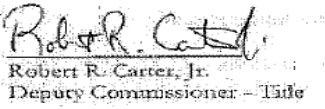
2009 Texas Land Title Institute – Page 39
Fee Attorneys: Ethical and Liability-Related Considerations Affecting Premium-Fee
Participation in Title Insurance Transactions
Commissioner’s Bulleting No. B0017-07
Title Bulletin No. 167
Page 2 of 2
described in Procedural Rule P-1, paragraph f, defined as “closing the transaction.” Part of
closing the transaction, as defined in Texas Insurance Code §2501.006(b)(4) and Procedural Rule
P-1, paragraph f, is ensuring that all proceeds are properly distributed. Handling all receipts and
disbursements includes paying off existing liens, distributing payments to all service providers
(for example, the realtor’s commission or the construction inspector’s fee), and, most
significantly, transferring settlement funds. P-22 attorneys disburse these funds using the law
firm’s client trust account (i.e. IOLTA accounts).
Fee attorneys, when performing functions defined as closing the transaction, are entitled to a fee
split also. However, because an attorney who is licensed as an escrow officer must comply with
the provisions of the Texas Insurance Code as if the attorney were a title insurance agent pursuant
to §2652.003(b), a fee attorney receives a portion of the insurance premium in accordance with
Procedural Rule P-22, subsection (A)(ii) and (B). Furthermore, because an attorney who is
licensed as an escrow officer must comply with all requirements of the Texas Insurance Code
concerning escrow officers and trust funds pursuant to Administrative Rule L-2, part I, subsection
D, a fee attorney disburses funds using the title agent’s escrow account.
It has come to the Department’s attention that some title agents have been disbursing funds on
behalf of the P-22 attorney when a lender requests an ICL and then splitting the premium with the
P-22 attorney as though the attorney had disbursed the funds. This practice is not permitted
because the P-22 attorney has not disbursed the funds and has not, therefore, performed all of the
duties defined as closing the transaction.
The Department’s position is not new and does not represent any change. The Department’s
position is consistent with the existing statutory scheme, which prohibits an ICL from being
issued when a P-22 attorney closes the transaction.
P-22 attorneys serve a valuable function and are encouraged to explore the various legal options
available to them in transactions requiring an ICL, which include but are not limited to becoming
licensed as an escrow officer and serving as a fee attorney. There is no statutory limit on the
number of title agencies a fee attorney may serve. This bulletin should not impact a fee
attorney’s practice, nor should it impact a P-22 attorney’s practice in closings where an ICL is not
required by the lender.
The Department will continue to examine agents for compliance with the law and will take
appropriate actions consistent with the efficient utilization of our resources to ensure such
compliance. This bulletin is a reminder for title agents and those in the title insurance business to
be mindful of all statutory and regulatory requirements. The Department will continue to
evaluate the utilization of its resources and take additional measures as needed.
